#narratively outside of characters I struggle to see how she gets the costs
Text
me projecting my character issues on stormblood by giving eyrie issues
#i just….I wish lyse wasn’t shoved so heavily into her box of authenticity and optimism#because after a while she becomes very flat#she can only go up so far before she starts turning into an NPC with only one thing to say#i wanted more acknowledgement of the horrors of war. the stumble and the fall#honestly give me more Fordola#she was so good. she was so wonderful#it’s a case where the quote unquote villains of the story were more interesting than the main characters#but. eyrie has issues. they take issue with Lyse’s optimism#and think she isn’t looking at the consequences#she doesn’t see how much war is going to hurt. what freedom is going to cost#it’s like she’s looking up towards the brighter future while eyrie is sitting in the muck and gross#of the cost of war. the pain and hardship#maybe they’re being unkind because their own past and lack of acknowledging the cost of war is in the back of their head#the worst part is that they don’t tell Lyse out of a sense of caring about the scars she’ll have from war#they tell her because she is an adult. she is making this choice and she is going to have to live with the consequences#alphinaud got off less with them telling him he fucked up#bc he knows he messed up. but also he’s a Child#lyse is a full grown adult and as much as she can say she understands the cost#to eyrie they don’t see it#narratively outside of characters I struggle to see how she gets the costs#owen plays ffxiv
5 notes
·
View notes
Note
Begging your indulgence, could you perhaps talk up the Baru Cormorant sequels to me a bit? I expected to love the first one, because it's so lauded by people who blog about other series I love, like Imperial Radch and Locked Tomb. But I read the first one and I honestly hated it. It was a struggle to even get through. But I still keep seeing people rave about the series, and from what people say, I think I might like the sequels more? Can you give me some spoiler-free advice? Should I read on?
So I had to put down the first book and walk away from the series for a few weeks after finishing it. I imagine you are feeling a similar sense of loss or betrayal, both from Baru as a character but also from the book as a piece of queer fiction, or in this greater family of Beloved SFF in the corner of the fandom. I am here to tell you that’s intentional, and to me, a good thing. I am also here to tell you if what you didn’t like about book one was the very end, you’ll likely be okay in the next books. If what you didn’t like in book one was the political machinations and Baru’s internal dialogue and struggles, you probably won’t like the rest of the series.
The Baru books do two things: They make you feel, intensely, and then they interrogate you. You are meant to feel this betrayal and let down after the first book. You are meant to feel resistance or resentment to reading book 2. It feels similar to the sunk cost Baru is setting up for herself. I’ve never had a book grip me and mirror within myself the emotions experienced by characters in the book so well. I feel personally attacked by Baru’s choices. I feel invested. It’s intensely personal, and it hurts. The books are trying to tell you something outside of the confines of the narrative about the human experience and how culture and society are knit into our minds and our flesh. I don’t know how to explain it. It’s highly possible this isn’t a universal experience, and I know it doesn’t work for some. But the biggest crit I’ve seen seems to revolve around readers not wanting or not knowing how to deal with that emotional response. They want some sort of relief or explanation, some turning point where things start to get better and make sense.That’s not what these books are about.
The books continue to posit the questions of book 1 and expand on them. They get funnier. They get sexier. They get really fucking wild and do some shit in fiction i’ve never seen done before. It’s exciting to read. It’s horrifying. It’s sad. It’s funny again.
Book two functions as a sort of pivot point for Baru. Not a rock bottom to then work up from and get better, but a pivot. She gains perspective, but doesn’t necessarily change course. It’s gayer, it’s less obviously tragic, it’s strange. There is death but not like book 1.
Book three is the panic. The scheme isn’t sustainable and we know it now. She’s moving forward but toward what? Will she finally apply what’s she’s learned and make the break? There are questions about magic and about belief and about math theorems. Is everything connnected or isn’t it? Is the question itself flawed? Iscend continues to be very sexy and distracting. What does it mean to be empress? Can she pull it off? You find out exactly what the fuck is wrong with Cairdine Farrier.
I found the end of book 3 to be as immensely satisfying as I found the end of book 1 to be painful.
In any case, there’s nothing wrong with putting the series down now. We all come to some books the group of trusted friends like and end up disliking them ourselves. It just happens sometimes. But I have never read a series quite like Baru and it is precisely because it is so difficult at times that I find it so satisfying.
That and Baru is going to fuck A Lot of very interesting women in book 2 and 3.
#baru cormorant#dunno if this actually helps or is just me waxing poetic about the series#but good luck
71 notes
·
View notes
Text
So I finally caught the full episode of What if. I mean...I didn't dislike it, but I didn't particularly care for it either. I think the problem is that the 3 central characters were still Steve, Peggy and Bucky, except with the plot and lines reshuffled...so the whole thing felt kinda superfluous. It didn't really add anything to any of their narratives, put itself in the awkward position of affirming the gayness of CATFA while trying to brandy the heteronormative narrative, and really didn't break any new ground.
You know what would have been nice? Make the serum receiver Isaiah. But I guess that requires too much thinking on the part of the scriptwriter.
The exchange that really bothered me was this one though:
Steve: I gotta ask, how does it feel?
Peggy: To get the serum? Honest truth, not as different as you might think.
Steve: Wow, you’ve always been a fighter. In a way, the outside finally matches the inside.
Okay, wait, hold up.
She's flaunting her able-bodied privilege in front of a man plagued by chronic illness and disability with, “Not as different as you might think.”
Let's remind ourselves of what Steve has to live with:

There’s a different list showing also colour-blindness, diabetes and anaemia.
You know what getting the serum means? He doesn't have to get short of breath walking up a flight of stairs, he doesn't have to get palpitations after a short sprint, he doesn't have to get sick every time the weather changes, he can hear people sneaking up on him, he can see the world in colour, he doesn't have to spend most of his income buying insulin (which was only invented in the 1920s so who knows how much they cost) and medications. He can finally do the stuff that able-bodied people, like Peggy, take for granted.
Peggy says it's not as different as he thinks, because she has no idea what he's living with.
And guess what, in true MCU ableist style, they then have Steve reply, "You've always been a fighter."
No Steve, the true fighter is you. Everyday was a fight for you. Sometimes in the midst of an asthma attack or an exacerbation of your rheumatic heart disease every breath and every heartbeat. Every winter when you come down with colds and sinusitis. Every time you get knocked back because of your deafness or colour-blindness or your small stature. Every time you're struggling to put a penny together because you've used it up for your medications. Every time the doctor shakes their head and wishes you luck.
Steve fought through all of it. In one timeline, he got the serum, and the outside finally matching the inside was you, Steve. Not some woman who has no appreciation of what she already has.
Good job MCU showing your ableist colours again.
(PS: I did not spot any pics of Sam in the opening sequence. Are they serious?? They've left out the next Captain America, one of the characters who will be expected to carry a franchise in their phase 4? What are they smoking??)
#what if#what if...#steve rogers#tfatws and then this#like legit i was starting to think peggy's portrayal was kinda cute#then i got hit in the face with this#well well well#a few sardines short of a can#is there ever going to be an iteration of peggy that isn't problematic#real question is will there ever be a portrayal of disability that isn't insulting#ptsd is not a joke#amputation is not a joke#ableism is not a joke
207 notes
·
View notes
Text
My thoughts on episode SIX…
OHH MY WORD THE NEW EPISODE WAS SO GOOD!!!!! I LOVED IT SO MUCH!!!!
It was exactly what I needed!!! 😁😁😁 I’m so happy right now - I’m loving this season!
Of course, I’d love it even more if two certain someones would care to grace us with their presence … but it’s fine - I can wait… I can be patient.
Though we did get a little closer - I definitely heard the Kid Flash zeta designation in the background - along with Bluebeetle, Static, Robin, Forager, Livewire and 2 or 3 names I could hear over Gar’s talking. (If anyone could confirm those that would be appreciated.)
I think I’m liking these recent episodes so much because they have that season 2 vibe. We’re seeing (and hearing) the heroes do their hero thing - working in the shadows, trying to solve the problem and working with the other heroes around them to get to the answers. I love seeing the newer hero’s getting a bit of screen time - and actual dialogue - because it makes them feel rooted in the world - instead of being just space filler or not speaking because its more cost affective to just show them. I get why these creative decisions have to be made - it just seems really noticeable in these last two seasons compared to the first two - and I still don’t really get why…
Anyway, it’s nice to see the other characters being a part of the story. Heck, I even liked hearing all the Outsiders zeta-ing away in the background - it really felt like they were just there but we just missed them. It worked well… I don’t want it all the time - I do want to see an actual non-montagey Outsiders mission or at least interactions with those characters since the show made me so invested in them last season - but I liked it here.
Guess this is a good point to talk about Gar and oh my god my heart is breaking for the boy! 🥺 He’s so broken right now and I really need someone to go comfort him through all the grief and trauma he’s bottling up… and y’know what, I kinda want it to be Bart. This has just popped into my head - but they’re pretty equal in many ways - they’ve both dealt with loss and heartache from a young age, they both like to hide behind their smiles, they don’t talk about their struggles, they’ve pretty much been adopted into their found families, they’re the same age. It would be cool to see this be the thing which finally gets Bart to open up about his own traumas to someone and finally break him out of the character he’s been playing for years with everyone… I really want more Bart content.
Also with every mention of Perdita we keep getting and Gar’s avoiding of her, I get a little more worried that she’s not going to survive the season. I’m convinced Brion’s gonna do something to try claim control of Vlatava and she’ll get caught in the take down and Gar will fail to get there in time to save her and it will destroy him (emotionally). He’ll be consumed with even more grief and guilt and he’ll want to take down the one responsible - Brion. This is the current narrative of events filling my head at the minute - but how ever it turns out - something bads going down with Gar, Perdita and Brion - and I’m not looking forward to it.
What I am looking forward to is more Orphan content. I knew I was gonna like her with that one little moment she had in ep.5 - and I was right because I love her and I can’t wait to see more and learn more about her. I’m even more excited for her interactions with Shiva - is this not the first villain mother vs daughter dynamic we’ve had in the show…? We’ve definitely had a lot of ‘bad’ dads - it seems it’s time for some ‘bad’ mums to join the roster.
Oh it’s gonna be fun…
LB
— END OF PART ONE —
#young justice phantoms#my thoughts#young justice#yj#young justice spoilers#yj4#young justice season 4#the outsiders#garfield logan#beast boy#bart allen#kid flash#orphan dc#lady shiva#perdita#brion markov#keepbingingyj#saveearth16#spreadtheword
39 notes
·
View notes
Text
Spring 2021 anime overview: Quick Takes
Now for my Spring 2021 anime thoughts! I’ve decided from now on if a season’s like, 20- to-24 episodes I’m just going to wait ‘til it’s done to review it unless I feels super passionately, so though I watched To Your Eternity (it’s good!) and MHA (eh), I’ll comment on them next time. Also, for the record, I watched the first eight eps of Joran: Princess and Snow of Blood but I dropped it because it had clearly crossed the line from entertainingly dumb to boring dumb.
I will probably give Supercub and some other stuff a shot later, this was a stacked season! May give updates on all that later, but this is what I have for now.
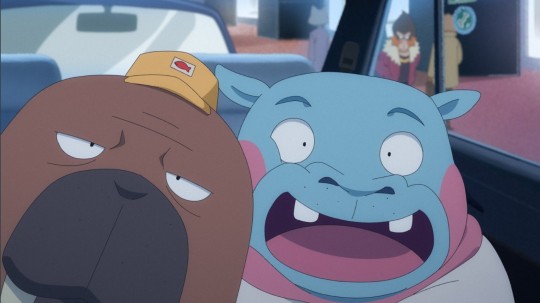
ODDTAXI
Quick Summary: A mild mannered middle-aged walrus taxi driver is drawn into a case involving a missing girl, yakuza, Youtube clout-chasers, manzai comedians and idols with big secrets.
It’s rare to walk away from media and be like “that is a singular experience I will definitely never see repeated again” but ODDTAXI is definitely one of those. A tense noir thriller murder mystery starring cartoon animals that spends an entire episode detailing the one (cat)man’s very fall into darkness triggered by addiction to gacha games and an online auction for a novelty eraser? Also there’s a porcupine Yakuza who speaks entirely in rap? Also there’s tons of meandering conversations about stuff like manzai comedy and the struggle to go viral on Twitter?
Admittedly, I had a hard time getting into the first episode, the dry meandering humor not being enough to hold my attention while I was sitting still, but once I watched this while I was working out at the end of the season, I found it an easy binge. A ton of characters with dark secrets or dangerous ambitions, each with their own part to play in a tableau of intersecting events- and it all actually comes together really well.(As for the female characters, it’s a pretty dude driven story, but they do get nuanced characterization and even some good heroic moments from one of them.)
It’s a great example of a carefully planned narrative paying off, with all the twists appropriately seeded and foreshadowed to reward viewers who paid attention. Even when it ended on a perfect “OH SHIT” moment and denied me closure, I couldn’t help but respect it. If you that all sounds interesting to you, definitely check out the first couple episodes and see if you like it- you’re likely to have a memorable, satisfying experience!
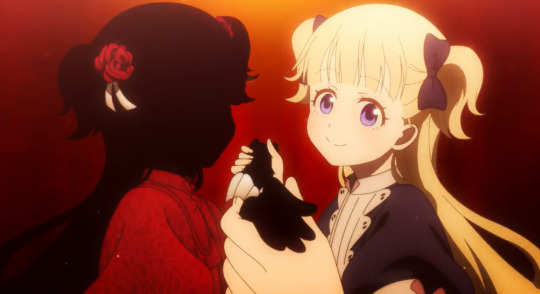
Shadows House
Quick Summary: Emilyko is a ‘living doll’ who’s told she was created to act as the ‘face’ of her shadow master, Kate. The shadows and their ‘dolls’ all reside on the mansion and are required to pass a ‘debut’ to prove they’re a good pairing. If they don’t pass, they might be disposed of. And so the mystery of the Shadow mansion grows...
This slice of gothic intrigue was my favorite of the season, tied with ODDTAXI. With an interesting premise, slightly tense undertones and a strong focus on character building and relationships, it kept me hooked the whole way through. And for any squeamish fans put off by the hype about it, don’t worry, while there are some suspenseful elements, I wouldn’t qualify it as horror. I thought the relationship between Kate and Emilyko might end up being a completely sinister one, but it’s thankfully a lot more complex than that and it’s really interesting to follow how both their characters and relationship grow. The focus of the show is, unsurprisingly, on the “dolls” slowly discovering their autonomy and personhood as they struggle under the rigid system imposed on them by the mysterious elders of this weird Victorian mansion. Can they develop a more equitable relationship with their shadow “masters” (who are also shown to suffer under this system)? There’s a lot to dig into there, and the show has the characters develop through learning to understand and appreciate each other, which is pretty heartwarming. Our hero, Emilyko, is the typical plucky ball of sunshine (they even nickname her sunshine), but she’s also shown to be clever in her own off-the-wall way and she bounces off the far more subdued and cynical Kate well, not to mention the other ‘dolls’ she ends up befriending.
What’s more, the show spends plenty of time to developing several other character pairings and combinations, and they all have their own interesting dynamic that makes you want to see more of them. Same-gender bonds are at the forefront of this show, and many of them are ripe for queer readings (I definitely appreciated the healthy helping of ladies carrying ladies), but even outside that it’s nice to see a show where a strong, complex bond between girls is at the forefront. My only real complaints about the show are the anime original ending is noticeably a bit rushed (though it’s not too bad, and leaves room for a season 2) and I wish the animation used the whole “shadow” theme more strikingly (like the opening and endings do)- instead the colors are a bit washed out which makes the shadows blend into the background sometimes. The “debut” arc also drags a bit in places, but it makes up for it by having a lot of good character integration.
I hope to check out the (full color)! manga soon and see more of this quirky, shadowy story. There’s some physical abuse depicted, sad things happening to characters and naturally the whole “oppressive familial system” thing, but otherwise not much I can think of to warn about. I give this one a big rec, especially If you’re a fan of gothic fairytales and stories of self discovery.
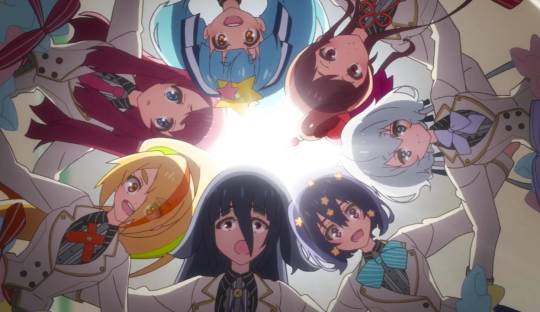
Zombie Land Saga Revenge
Quickest summary: In this sequel season, everyone’s favorite zombie idol group must claw their way back into prominence after a disastrous show- the fate of the Saga prefecture LITERALLY depends on it!
This was a fun follow-up to the first season- if you liked the first zombie-girl romp, you’ll probably enjoy this one. In fact, there were a couple areas it improved on- namely, Kotaro failed, ate crow and embarrassed himself a lot more this season, which made him more likeable (as did the fact the girls gained a lot of independence from him). This season also shed more light on what the ‘goal’ of this zombie raising project is and what kind of shit Kotaro got involved with to make this happen, and it’s appropriately off-the-wall and ridiculous. We finally got some backstory for Yugiri too! I wish it had focused on more of her interiority, but she got to be a badass in it, and it was a treat to see this zombie idol show turn into a period piece for a couple episodes (also her song ruled).
Tae also got a cute focus episode and there was a particular SMASHING performance early on! Also That revelation last season that had the potential to turn creepy hasn’t yet, and hopefully never will. The finale was heartwarming with big hints of more drama to come- I’m definitely down for more zombie hijinks!
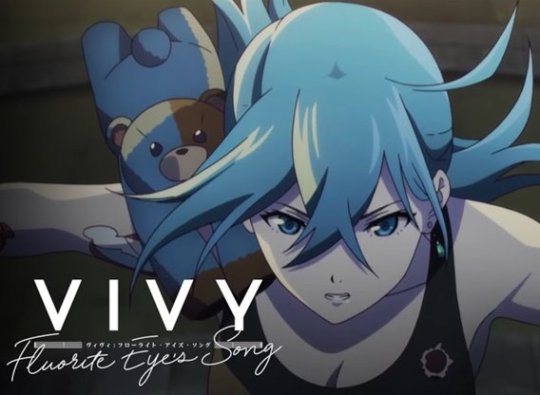
Vivy: Flourite Eye’s Song
Quickest Summary: A songstress AI named DIVA (nicknamed Vivy) is approached by another AI named Matsumoto, who says he’s from the future and they must work together to prevent AI exterminating all of humankind 100 years from now.
This show is absolutely gorgeous visually with some really nice action scenes, but when it comes to the story my feelings basically amount to a shrug. It’s fine! I guess! Vivy starts out as an interesting layered character- and I guess still is by the end- with her stoic but stubborn determination bouncing off her fast-talking bossy partner Matsumoto well. She never listens to him, which is delightful. The way the show took place over the course of 100 years was an interesting conceit as well. However, it bought up a lot of themes and then sort of... dropped them. For instance, Vivy interprets her mission (PRIME DIRECTIVE if you will) as protecting humans at all costs, no matter how destructive said humans are or what their fate is supposed to be, and is perfectly willing to murder her fellow androids to do this, showing she inherently thinks of androids (herself and her own people!) as less worthy. Which is a little alarming! There’s a very dramatic point in the show where they bring this up as a potential conflict for her character but then it’s sort of...dropped. Pretty much.
Actually, despite the premise, the show doesn’t dip into the “AI rights” as much as you think it would with the main theme being more about Vivy’s search to find her own creativity and discover what it means to ‘pour your heart into something’. Vivy herself doesn’t actually care if she has rights or anything. Which is in some ways fine, because ‘AI as an oppressed class’ has been done to death, but IT’S ALSO KIND OF IN THE PREMISE, so that means that the show just shrugs really hard at a lot of the questions it brings up basically just going “humans and AI should work together probably” and that’s it. There’s a lot that feels underexplored. The antagonists in the show also either have motivations that don’t really make sense or have boring hackneyed motivations. In the finale in particular, it feels like a lot of things happen “just because” and it falls a little flat.
I also have to warn that one of the arcs focus on a robot ‘pairing’ where the dude-coded robots actions toward his partner are straight up awful and rob her of her autonomy, but it’s played like a tragic love story. I suppose you could read it differently too, but it definitely made me go ‘ew’ the story seemed to want me to sympathize with this robo dude,
Overall, I wouldn’t anti-recommend this show, it’s an all right little sci-fic romp (and definitely SUPER pretty). My favorite element was definitely the episodes where Vivy develops an entirely new (an loveable) personality, because it played with the idea of of an AI getting “rebooted” really well and interplay between her two “selves” was done really well. But there are a lot of other parts of the show that just feel...a little underexplored and empty, making me have an ‘eh’ feeling on the show overall. It’s definitely an ambitious project, and while it didn’t quite stick the landing, there’s something to be said for a show that shoots for the stars and falls short over a show that just languishes in mediocrity.
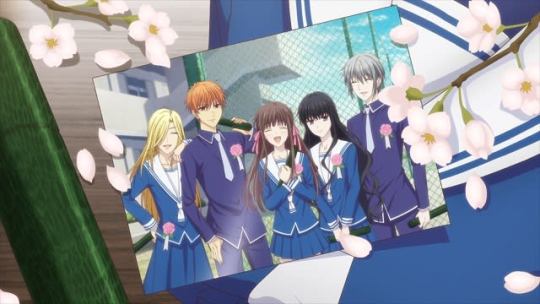
Fruits Basket The Final
Quick summary: The final season of that dramatic drama about that weird family with a zodiac curse and the girl who loves them.
It’s very weird that after not cutting a lot out, they kinda sped through some material for, you know, the finale. I guess they thought they couldn’t stretch this final arc to 26 episodes? Or weren’t cleared for another double cour? However, though there were a couple places that felt awkward, despite being a bit condensed it mostly held together pretty well for a D R A M A T I C and ultimately heartwarming conclusion. I was really disappointed they kept the part where Ritsu cut their hair for the ‘happy ending’, I thought their intro episode not showing them in men’s clothes meant the anime had decided their presentation didn’t need to be “fixed” but WELL I GUESS NOT. That was the only big upset for me though, otherwise the adaptation went about how I expected, sticking to the source material. Furuba has a lot of bumps, from weird age gap stuff to ...gender, but it also has a lot of important feels and great character arcs. It was a gateway shoujo for many and has its important place in animanga history, so I’m glad it finally got a shiny, full adaptation.
#anime overview#spring 2021 anime#shadows house#oddtaxi#zombie land saga#fruits basket#vivy: fluorite eye's song#zombie land saga revenge#fruits basket the final#anime#my reviews#long post
68 notes
·
View notes
Note
Hiya 👋 I find it fascinating when people point out stuff about main characters that are brushed over and was I was wondering what’s your top reasons you dislike Alina and what scenes made you dislike her / made no sense.
Well I don't dislike Alina in the show but in the books I do think she is badly written. But here are some things that made the book character less appealing to me than the show.
I think the main one is her complete lack of agency. She very rarely makes any decisions for herself and just seems to go along with what everyone else (mostly male characters) say. There is a problem and instead of Alina being the one to make a decision or think of a solution she is told this is what we are going to do by either, M*l, Nikolai or the apparat. She is pushed around the plot by others actions instead of taking control herself and so often appears more as a puppet than as a commander or influential person in herself. For example in the show Alina is the one who tells M*l that they should seek the stag and kill it for it's amplification powers before the darkling does. Yet in the books this decision isn't hers but M*l's and Alina just goes along with it. There are also several instances where she clearly doesn't agree with the course of action or doesn't want to do something and yet she does it anyway, an example of this is when Nikolai and M*l want to attack the Volcra nest in the fold. She clearly has qualms about it but ends up folding to their will, another example is M*l insisting that once the fold and the darkling are destroyed that they seek a way to remove the amplifier, again this is something Alina doesn't want to do but she agrees with M*l and doesn't tell him her true desire. So what we end up with is a female protagonist who very much seems to be a pawn to the male characters in the book.
Another thing I disliked about the character's storyline is that she was often the victim of men, held captive and used to their advantage and this included one the supposed heroes. The darkling takes her captive twice wanting to use the amplifiers and control her to meet his own goals, Nikolai also at one point takes her captive and only really gives her freedom back to her because she agrees to help him, and the apparat takes her captive so that he can use her to gain religious power over the masses. She also never gets herself out of these situations, she just accepts her situation and waits to be rescued, for others to save her so that they too can use her for their own gain. I find this theme of her either being a victim of men or the pawn of one really worrying.
Another issue with the way she is written which again ties into the two above is that she is made far too dependant on M*l. Not only does she make herself very ill by suppressing her powers to stay with M*l but when her powers are revealed her refusal to let go of her attachment to M*l means that she struggles to master her powers, she becomes physically unable to summon because her refusal to let M*l go. Later in book two and three she spends a lot of time pining after him and getting in arguments about their positions of power. M*l feels useless and resents Alina's new position and power, he wants things to go back to how they were. He really does hold her back in many ways and this really should have been a love that they both grew out of but instead despite it being made obvious that they don't really fit together they both refuse to let the other go which means one or the other has to make sacrifices in order for them to be together. Not only that but Alina often puts M*l's needs, wants and safety above the greater good, rather than save the grisha or other vulnerable people she will safe M*l even going so far as to let 30-40 innocent people die in the fold so that she can save his life. This co-dependant relationship that she has with M*l is very unhealthy and toxic which would be ok if this was recognised within the narrative and then steps were taken to fix it, but instead this relationship is presented as some grand love story despite how damaging it truly is to Alina. In the Tv adaption they show us that Alina can be very happy and actually thrive without M*l in ep 5, its the happiest we ever see her and the most confident, yet she never gets this opportunity in the books.
Alina is also very insecure and jealous and we often see her pitted against other females, in particular Zoya. If there is one thing I really am not a fan of its authors pitting women against women particularly when it is over a man. Throughout all of the books Alina is insecure that Zoya is more beautiful than her and is insecure about her own looks, particularly when is comes to M*l, she is often jealous believing M*l will be turned by other pretty girls instead of him staying loyal to her. She often worries that she won't be good enough as the Sun Summoner and that the people will come to hate her. Again all of this would have been fine if it were limited to just the beginning of her story arc and it was something she overcame, but she never really does. She often comes across as being quite sulky as well. There was this one quote that I kept seeing in the tag that Alina says which is 'I am the Sun Summoner. It gets dark when I say it does.' Obviously before reading the books I kept wondering the circumstances of her saying this. It is a bit of a badass quote so naturally I was imaging all kinds of grand, dramatic scenarios, her shouting it across the battlefield to the darkling, her saying it in a war meeting as they are making plans as a way of instilling hope and confidence in her troops. So you can imagine my disappointment when it is actually said whilst she is lying outside on the ground, sad and feeling sorry for herself. When presented with a problem or a wrench in a plan she doesn't rally her team and try to come up with a solution instead she just sulks which as a reader I found very frustrating. The thing is both Alina and M*l are written as rather realistic teenagers, but the problem is this doesn't fit the world they are living in. They live in a world based off imperial russia and yet the characters do not behave as if they are, instead they act like they are modern day teenagers attending high school with petty jealousy and childhood crushes.
There is also her identity as a grisha and relationship with the grisha. One of the more interesting aspects of the grisha trilogy is the grisha's story, their oppression and their fight to be recognised as human beings and equals. Yet Alina shows very little care for the Grisha. In fact to me it seems like the author just made Alina grisha to serve the plot. Alina is grisha because the narrative needs her to be, they need her to be powerful enough to defeat the villainous darkling and destroy the fold. Instead of striving to improve things for the Grisha Alina supports the monarchy that has spent centuries oppressing them. The moment LB no longer needs Alina to be grisha she is stripped of the identity and the grisha are left in their misery in a world that still hunts, kills and enslaves them.
Alina is also often punished in the narrative by other characters but also by herself. She is often shamed for the attraction she felt towards the darkling and is called things like stupid girl. Not only is she blamed for falling for the darkling's manipulation she is also told she is greedy and power hungry for seeking out the amplifiers and political power. It's a very twisted message that is sent because we are told she is seeking the amplifiers to stop the villain which is a heroic cause and yet we are also told that she is doing out of greed. There seems to be this message that women should not seek power or a change in their position because that means they are greedy and evil.
Then after three books of the protagonist being used as a chess piece by the men in the story she gets one of the worst endings a heroine could. Both Nikolai and M*l get what they want in the end but its at a cost to Alina, Nikolai gets the Ravkan throne and M*l gets the quiet farm life with Alina as his wife. But Alina loses her powers and the position of power she got with them. The two things she explicitly asks for and tells us she desires, her position as general of the second army and her powers/amplifiers. In fact she even tells us in the second book that given a choice she would not give up her powers not even for M*l. Yet that is what happens and worse than that the narrative tells us that she was wrong and greedy for seeking power and influence, they present this ending she gets as a happy one because she gets to spend her life with M*l living a nice normal life. As a reader I found this difficult to except because the character had told us on many occasions that it was not what she wanted, we are shown often how miserable she is without her powers and yet we are expected to believe that this was some wonderful fairytale ending for her when it seems like whilst the men got their happy ever afters it was at the expense of Alina.
There is probably more but before this turns into a full on rant I think it best to leave it here.
52 notes
·
View notes
Text
Since the finale aired, I’ve been yammering on about how it would’ve only worked as a finale to s2, and now that I’m actually rewatching s2, I stand by that even more staunchly. The finale doesn’t work in a post-s2 supernatural universe.
This is the version of Dean we saw in the finale-- the one whose only mission in life was to Save Sammy, to help him get his revenge and allow him to go out and live a Normal Safe Life pretending that hunting and monsters don’t exist. The one who just wanted some pie, to drive his car, and had no real connections beyond Sam in the world outside of Bobby. Even Dean’s characterization in the finale is this far younger Dean who’d never allowed himself to crack open and truly understand love. It would take me years to plow through everything I’ve ever written about him as a character and his long struggle to emotional maturity we saw evolve over the next 13 years beyond this episode, but the tl;dr will always be “this s2 Dean is the same as the Dean in the finale.”
The goal of s2 was saving SAM from his “destiny,” too. In this era of the show, Dean didn’t have a “destiny” the same way Sam did. The ONLY thing that mattered was freeing Sam from “becoming evil,” and being manipulated into terrible things. What Dean wanted, what he was “destined” for by the narrative was irrelevant, because all of his choices and emotional burdens were tied only to saving Sam. To freeing Sam so he could safely return to his “normal life.” Go back to college, have a family and the white picket fence life.
This was before Dean truly began fighting for HIMSELF. Which only really and truly began after he sells his soul to resurrect Sam. That’s when Dean truly begins fighting for himself. Sure, he’s angry with John during s2 for trading his own life for Dean’s, for putting the burden of “if you can’t save Sam, you’ll have to kill him” on his shoulders with his dying breath, but Dean is still fighting against John’s authority and the complicated tangle of feelings of his own childhood and not actually coming to terms with his own wants and needs and wishes out beyond that yet. He’s still unwittingly confronting the “destiny” John had set up for him, and hasn’t moved beyond that yet. It’s only trading his soul for Sam’s that finally brings Dean into the cosmic narrative that will fuel his introspection and personal growth for the rest of the series.
And out beyond that point, his entire character arc explodes into orbit.
Dean’s entire character arc in s3 is confronting this very basic fact: he doesn’t deserve to have been sacrificed just to save Sam. He doesn’t deserve that burden, and he does deserve to live. This is the realization he comes to before eventually being dragged to Hell and then rescued by an angel, who literally tells him, “you don’t think you deserve to be saved” in the aftermath of that. From that point on, we have TWELVE SEASONS of Dean struggling with what he “deserves” versus what is “fate” and “destiny” and eventually confronting what he WANTS if he truly could choose his own destiny.
Plus, out beyond that point, he has Cas. And nothing changes Dean, pushes him to grow and understand himself, and accept himself-- all of himself, from the good to the horrific-- than the pure and unflinching acceptance of Castiel. Cas never looked at him and said “you are evil,” or “you are worthless.” (well, they’ve both said some pretty awful stuff to each other over the years, but there was either brainwashing or other deeper issues pushing those things on them, and they have ALWAYS eventually come back to one another, and the awful stuff was dealt with). Point is, Dean and Cas both began running these parallel arcs of duty versus desire, and for Dean, the duty was always framed around “taking care of Sam” versus pursuing any sort of ambition or goals for himself. They would fight for this for most of the rest of the series, until eventually the goal for ALL of them would be about discovering what they would want for themselves.
The show explicitly dealt with this, repeatedly, over later seasons, asking all of the characters the big questions: is this what you would choose for yourself? What WOULD you choose for yourself if you could?
And then they made the narrative of the final season, of the final Big Bad, the fact that they had NEVER had real freedom, and that their entire lives (and the entire history of not only this universe but every parallel universe) had been Chuck’s Puppet Theater, and true free will had been a lie all this time. Pushing all of the characters to confront their own choices and understand what about who they were as people was separate from what Chuck pushed them into choosing and doing all these years. The main thing that Dean (and also Cas, and to the extent she was included in the narrative this was Eileen’s issue as well) were being pushed to come to terms with what really was real, and were their feelings and choices their own or imposed on them for the furtherance of Chuck’s story.
At the end of the road, finally free and out from under Chuck’s control, they knew what was real. For Sam and Eileen, they had chosen each other. Cas had chosen Dean, but Dean hadn’t yet had a chance to reply, but anyone with two eyes and a brain knows what he would’ve said in return. It’s what Cas stopped him from saying even back in Purgatory in 15.09. And yet, for some reason Sam and Dean forgot all of that, as if none of it had ever even really happened at all, and we went right back to who they were right after they finally defeated the YED, before we even knew Azazel had a name, let alone the fact that the ultimate boogeyman of their entire lives to that point had been nothing more than a fanatic pawn in a much larger destiny for both of them.
The end of s2 was the last time Dean sacrificing himself so Sam could have a normal life, where Dean really felt there was nothing more for himself than fulfilling his father’s orders to save Sammy, even feels remotely plausible. It’s the last time we can feel like Dean might find peace and contentment in a Heaven where John is nearby to be proud of him, and where Dean would actually feel like that validation was even relevant to his own life.
And that finally brings me back to s2, where that was actually addressed through John’s self-sacrifice to save Dean, to serve Dean up to the narrative and provide a stage for this self-transformative journey INTO being a version of John himself. Only... Dean DOESN’T choose that. He fights to save Sam at all costs, even when it seems clear that the right answer would probably be to KILL Sam instead. When not only the ghost of John Winchester plaguing Dean’s mind would make him doubt his own drive to save his brother, but the John Winchester Insert Character of s2-- Gordon Walker-- basically put Dean’s own doubts out there in plain words in 2.10:
GORDON: I'm surprised at you, Dean. Getting all emotional. I'd heard you were more of a professional than this. Look, let's say you were cruising around in that car of yours and, uh, you had little Hitler riding shotgun, right? Back when he was just some goofy, crappy artist. But you knew what he was going to turn into someday. You'd take him out, no questions, am I right?
DEAN: That's not Sam.
GORDON: Yes it is. You just can't see it yet. Dean, it's his destiny. Look, I'm sympathetic. He's your brother, you love the guy. This has got to hurt like hell for you. But here's the thing. It would wreck him. But your dad? If it really came right down to it, he would have had the stones to do the right thing here. But you're telling me you're not the man he is?
This, the episode where Dean finally confesses John’s final orders to Sam, where Dean has decided that saving Sam is all that matters, even when circumstance and everyone else is practically screaming at him that this could all be over if only he gave in-- be it his own self-sacrifice OR killing Sam. Six of one, half a dozen of the other, the universe doesn’t care (and neither does Chuck... especially at this point... and the proof of that is Sam’s s15 nightmares where one of Chuck’s alternate universe endings for Sam and Dean was Sam actually going Darkside on demon blood and killing Dean... any iteration of the old drama, Chuck has explored all potential endings-- oh, except the ending where TFW gets to just be happy and live... that’s the one ending they never get and the only one they deserved in the end).
also from 2.10... loads of chat about “destiny” and one of Dean’s first “we should just lay all this shit down and take a vacation” moments when he suggests they go to Amsterdam and enjoy some of the not-coffee-coffee-shops, which Sam counters by doubling down on the fact that Dean has a destiny in all this as much as Sam does:
SAM: Well, come on, dude, you're a hunter. I mean, it's what you were meant to do.
DEAN: Ah, I wasn't meant to do anything, I don't believe in that destiny crap.
SAM: You mean you don't believe in my destiny.
DEAN: Yeah, whatever.
SAM: Look, Dean, I've tried running before. I mean, I ran all the way to California and look what happened. You can't run from this. And you can't protect me.
DEAN: I can try.
And that’s it, right there. This is the “neither of you can try for a normal life outside of the other while the other is still alive.” This is Sam pinning a destiny to Dean that’s just as inescapable within Chuck’s narrative as Sam’s demon blood and psychic powers.
This is the core essence of Chuck’s story about them. The sibling dynamic that Chuck failed to free himself from, and that Sam and Dean failed to free themselves from after Chuck’s demise in 15.19.
Destiny. One must die so the other can live.
And considering the next 13 seasons of the show and the long and emotionally grueling character arcs Sam and Dean proceed through where they truly confront the core of who they are as people-- as individuals outside of their duty and destiny-- the finale ceases to make any sense outside of Chuck’s narrative for them. If 15.20 really happened exactly as we saw it on screen, then Chuck still won.
And they had to loop Sam and Dean all the way back to where they were emotionally at the end of s2 in order to make it seem plausible. Which, for those of us who actually care about what they endured after s2, makes the finale entirely implausible as a whole.
#spn 2.10#spn 15.20#spiders georg of the tnt loop#while i was writing this up i also watched 2.11 and yep... still holds up#the ghost of john winchester#chuck's process
106 notes
·
View notes
Text
LGBTQ Manga Review – Syrup: A Yuri Anthology Vol. 1
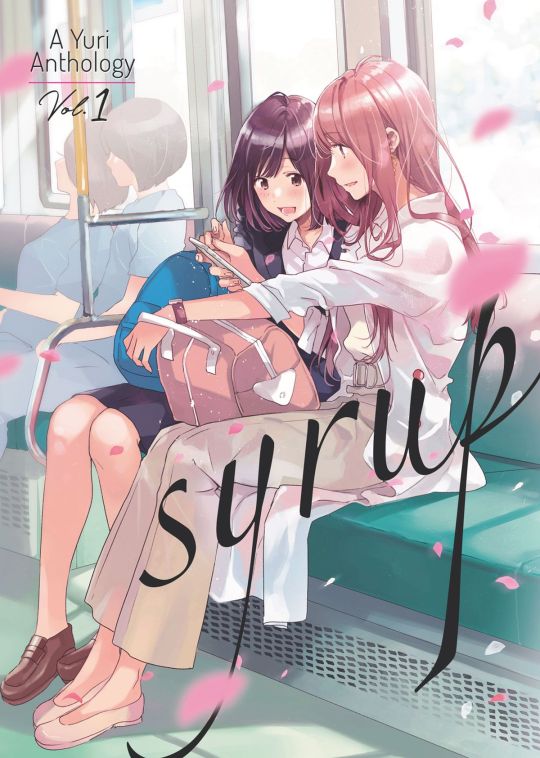
Shakaijin Yuri, stories featuring love between adult women who have left school, is a well-established corner in the Japanese Yuri market. Over the past few months, the scene started to pick up its full force in the West. English audiences are experiencing new Shakaijin series, both contemporary like Still Sick and older such as The Conditions of Paradise. For me, there are few works so prolific and intrinsic to the Shakaijin boom as Syrup. In Japanese, the subtitle reads Shakaijin Yuri Anthology. While the English release drops the subgenre's label, the content remains the same, an anthology dedicated to nothing but Yuri love stories featuring adult women from some of the Yuri industries best. However, Syrup's focus on mature and workplace stories more than piqued my interest. However, readers will likely be disappointed with this inconsistent and often forgettable anthology that is just as sour as sweet.
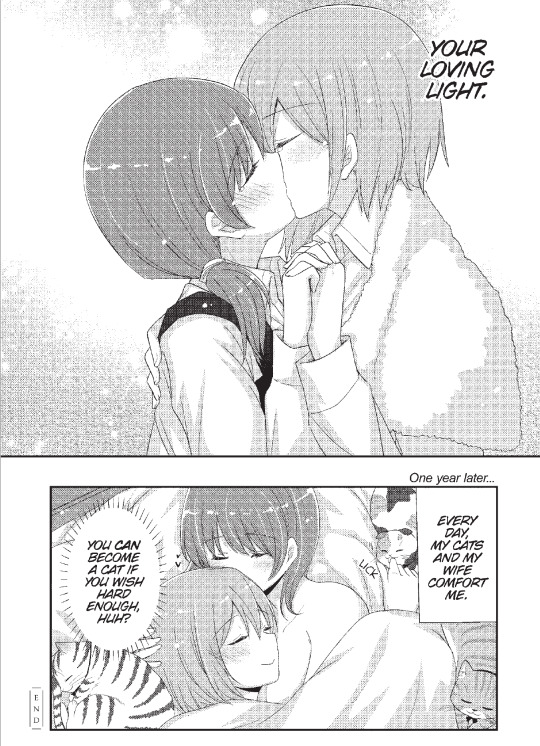
One of Syrup's main draws is its contributors. Some of the best in the Yuri world touched this manga, and even Western Yurijin will likely recognize a few of the names like Yukiko (Futaribeya), Itou Hachi (Kindred Spirits on the Roof), and of course Morinaga Milk (Girl Friends). It is always exciting to read a story from one of your favorites. Even I, who cares rather little for authorship, was happy to see Ohi Pikachi, who wrote the incredible Our Teachers are Dating, among the list. It also provides readers with a chance to familiarize themselves with unfamiliar creators like Amano Shuninta and Kurogane Ken, who grace the anthology with some of its best chapters.
Another benefit of having such a variety of contributors is the plethora of different art styles in the anthology. There is such a stark yet fun contrast between more mature or sensuous styles like Matsuzaki Natsumi and Ito Hachi's bubble moe characters. The manga spans almost every point between these two styles, and just flipping through the pages to look at the artwork can be a fun experience. Of course, some are more polished than others. Mochi_Au_Lait's simplistic and flat style stands as an unfortunate outlier among some other fabulous artists. However, their story, "The Cram School Teachers," is one of the funniest in the anthology. Not every story's aesthetics will suit all readers, but that is the point of a collection, to sample a wide array of talents. Fly's beautiful cover illustration wraps the fantastic art within, standing as a crown jewel of Yuri manga covers.
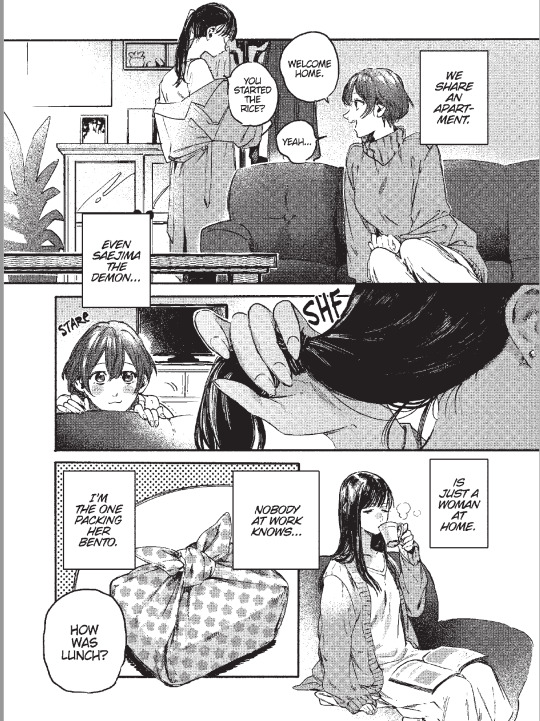
Unfortunately, the plot and characters are not nearly as enjoyable as the art. While a mixture of aesthetics can add to a work, different story styles often feel inconsistent. For this reason, I usually prefer collections of a single author's short stories, like Rouge Nagashiro's Eve and Eve and Morishima Akiko's The Conditions of Paradise. However, a unifying theme can often correct this issue. Sadly, a few too many of the stories seem to revel in the more "adult" allowances of adult characters and ironically created some of the most immature entries in the anthology.
Before diving too deep into the weeds of mediocrity, there are some chapters in Syrup worthy of highlight. Two of the best chapters, Shioya Teruko's "Promise" and Kurogane Kenn's "Rose Quartz" feature women in established relationships taking the next step in their relationship. Reading about these women celebrate their feelings for each other is wholesome, charming, and even sensual. The latter of the two stories is also one of the few to use adult content in a way that feels more mature. It clarifies the characters' love and attraction for each other, rather than just flashing a panel of exposed breasts for fanservice. It is great to see artists use their allowance to show a little more in profound ways while not letting it run away from them. It demonstrates admirable restraint and thoughtful writing that respects its characters.

Other interesting chapters include "Mama X Mom," which is less about the sexual relationship between two women and focuses on the character's emotional bonds in a unique situation. Ito Hachi's "First Grown-Up Love" perhaps lives up to the Syrup title the most, as it is an adorably sweet and fluffy tale of first love at adulthood. As one of the longer stories, it also has a bit more time for subtly and, thus, it includes some of the stronger and more interesting characters.
Sadly, most of the stories in Syrup are incredibly mediocre. Telling a compelling narrative with interesting characters in such a brief form, in some cases as short as six pages, is a daunting task that most chapters fail to overcome. They are utterly dull and forgetful, with characters designed with little more than maybe a job and the fact that they are interested in a woman in mind. They leave little impression, and even in the moment of reading, one finds themselves tired and wishing for the passage to end. A few tales show some modicum of potential, like Kodama Naoko's "Daily Smile," but they often end before they can get going.

A few dull chapters are acceptable, as tastes will vary, and many will enjoy some of the stories that left me utterly unenthused. However, where Syrup struggles are in its weak chapters. Some, like Yoshimura Kana's "Coward Queen," a confusing and offputting depiction of two women making a pornographic movie, and Matsuzaki Natsumi's "My Femme Fatale" revel far too much in displaying as much nudity as they can get away with before being labeled as porn. The former of these portray a lust for sadism that clashes with the rest of the primarily mundane anthology. It might even spoiler the next several chapters, as it is one of the first stories and leaves readers with immense displeasure.
There are some questionable attitudes towards boundaries and crossing lines, even outside the more salacious and exploitative stories. Depictions or descriptions of actions like staring at a woman's underwear or breasts, or awkwardly splurting out "I'm a virgin," are tossed out casually, often portrayed as romantic. Now, this manga is a work of fiction and can be enjoyed even with some more questionable aspects, as they usually are not deal breakers here. However, the dated attitudes feel like something out of an '80s comedy, not in a manga that, in all else, appears to at least attempt to hold an air of realism. This pervasive element at best makes an already struggling story worse, but it can add unpleasant notes to otherwise delightful offerings.
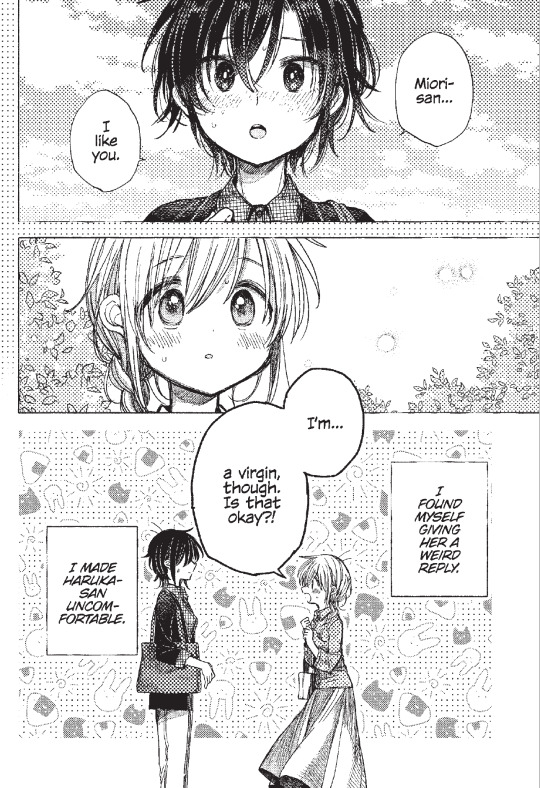
There is no better example of potentially compelling work squandered by its unsavory elements than Morinaga Milks "Working with an Angel." It starts pretty well, introducing readers to an entertainment agency manager with a forbidden otaku friendship with a model. However, instead of taking a more intelligent or realistic approach of the two trying to keep their growing relationship secret or a heroic, "consequences be damned," declaration of love, the story turns sleazy. The model wants to show her naked body off to the manager as the latter admits that she spies on the models while they change. Off-putting is the most generous review of this final chapter.
While Syrup: A Yuri Anthology has a few bright offerings of sweet and compelling relationship between adult women, it is incredibly bogged down by forgettable and mediocre stories. Few stories can present more than a weak premise and characters best described as "female" within their short page count. More objectionable, with a few notable exceptions, Syrup muddles its attempts to show how grown-up Yuri can by mistaking boobs and fanservice for maturity. Yes, Shakaijin stories, tales of adult women can be sexy. In fact, they should be more than willing to describe inelegance and lust; after all, for many people, that is what love is. Still, too often, Syrup forgets the heart, affection, and emotion, substituting them for cheap, uninspired story beats and characters. There are some chapters worth readers' time, but unless you are a hardcore fan of a contributor, this is an easy skip
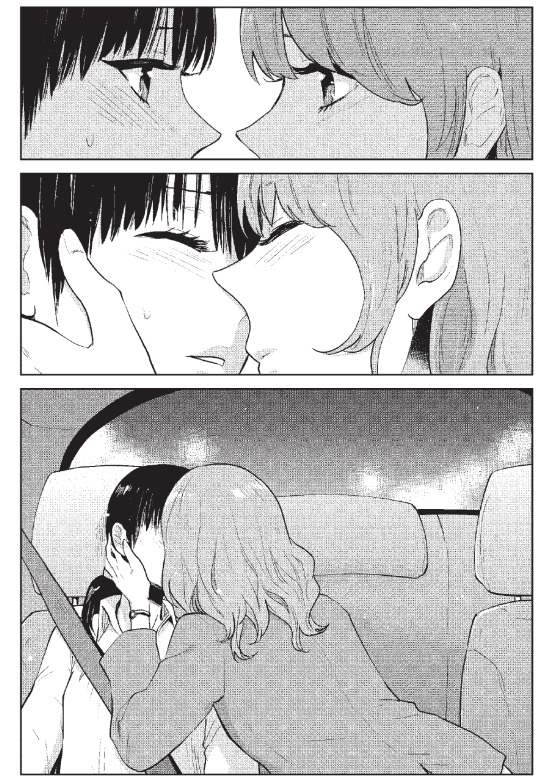
It is challenging to award ratings for Syrup, as each story's merits vary. Some are a comfortable 8 or 9 and others a measly 2 or 3. However, the majority of the book was unobjectionable yet poorly constructed fluff, as respected in the scores below.
Ratings:
Story – 5
Characters – 3
Art – 8
LGBTQ – 6
Sexual Content – 8
Final – 5
Review copy provided by Seven Seas Entertainment
Purchase Syrup: A Yuri Anthology Vol. 1 digitally in print: https://amzn.to/39ObT5F
Legally purchasing manga helps support creators and publishers. YuriMother makes a small commission from sales at no additional cost to the consumer.
#yuri#manga#reviews#lgbt#lgbtq#lgbtq+#queer#gay#romance#art#lesbian#lesbians#wlw#girls love#gl#syrup#sweet#comics#anthology#collection#literature#books#anime
436 notes
·
View notes
Note
Re: the recent request about "merging" and also your post a while back about reminding you to talk about 9s and their interactions with entertainment media (movies, etc.) - whenever you have time I would love to hear your thoughts on this! What exactly does "merging" mean? Is it a lack of emotional boundaries? Or a kind of easy identification with characters? Thank you! I hope you're having a good week so far!
9s merge into whatever is happening around them and get swallowed up by it, whether that is other people with louder personalities or the world in general. They have no real boundary against the outer world, and it consumes them. So naturally, 9s would get ‘swallowed up’ by entertainment and merge into it, partly because the brain doesn’t consciously discern between false and real realities in terms of what we “see” happening. 9s think they lack the inner resources to stop this from happening and put up a boundary, so they are ‘helpless’ against it until they realize that they totally can put up a boundary and block things from becoming ‘part of them’ but until that happens... they get swept along.
I have at least eight separate 9 friends that I interact with on a regular basis, so I have a lot of time to watch and think about them. And one thing in particular struck me as interesting -- I happen to love the remake of 3:10 to Yuma. I think it’s a great western, but two of my 9 friends hated it and love the original... so I decided to watch it for comparison. And midway through the original, it dawned on me that the original is the “9 version” and the remake is the “8 version.” The original has a rather pleasant, mild-mannered, congenial villain who even though he is a murderer is a pleasant villain to be around--and the remake’s villain is someone who stabs people in the face with forks and shoves them off cliffs. The original villain is someone you could pleasantly see spend a few years in prison and you wouldn’t mind them getting out again, and the remake villain would probably cut your throat in your sleep. Not only that, the movies themselves are 9ish vs. 8ish in their overall vibe -- slow moving and dreamy original, intense and visceral remake. So I laughed and thought, “Of course 9s would prefer the original, it’s so much more pleasant!” There’s nothing in it to upset them particularly or make them merge into anything they don’t like.
That caused me to start thinking about the other 9 feelers I know and their movie preferences... and how I was usually the one to engage them in stepping outside their movie comfort zone and consider watching something more intense. Some of them loved it, but others did not; and I noticed they had a lot of favorite shows and whatnot where the conflict was all very muted and/or easily resolved. Several episodes into the West Wing, I commented to one that “nothing much happens.” She practically beamed as she said, “I know! It calms me!!“ Another 9 loved old sitcoms because they’re funny. One 9 had a bad reaction to a movie where her favorite actor played a villain, because it made her feel like she was a bad person too for merging into him (as usual). It’s almost like the barriers come down and they are ‘part of’ the characters or the stories; in some instances, it feels for Fi-doms like things are happening TO THEM due to the self-insertion that happens instinctually with Fi-9.
I’ve also noticed as writers, they avoid spending too much time with villains or maybe do not want to create them in the first place. This puzzled me (tbh, I live for writing villains and anti-heroes) so I asked some questions and got a lot of similar answers -- they didn’t want to “spend that much time” with a villain (same for reading about them, or someone they “dislike”) or merge into them, they did not want to think about unpleasant, mean, cruel things (because it would be them doing it in their imagination), and they want to keep things overall mild-mannered and free of conflict. Internal conflict rather than external villains is a huge theme I’ve noticed, especially with FP + 9s. Jan Karon’s Mitford books are written from a 9 point of view (everything calm, peaceful, even-keeled), and most of the direct conflict comes from inside her 9 Father Tim -- who angsts about making minor changes in his life, procrastinates about asking out the beautiful woman next door for months, and sits calmly throughout an 8′s tantrum without moving or saying anything. Karon “leaves the room” for a lot of unpleasant scenes and conversations, leaving you to imagine what was said or done / the fall-out, I presume because she doesn’t want to “live them out.” I’ve seen other 9s avoid writing too much about a bad guy, decide to take him out of a draft, or struggle with writing something with a truly evil person in it. Another 9 friend wrote an entire novel where the only villain was internal angst.
This seems to be more common in feeler 9s than thinker 9s; an ISTP 9 I know has no trouble reading or writing about bad guys, although she doesn’t like certain kinds of intensity in entertainment and admitted it once took her hours and hours to get through an hour and a half long movie, because it was “too much” (too intense, everybody dies, nothing good or nice happens).
9s want to use movies and books and writing to “relax” and relation for them is of course PLEASANT. They want to be at inner peace and that means shutting out or avoiding anything that threatens to make them uncomfortable.
One 9w8 ISFP doesn’t mind watching unpleasant or dark things, but she gets mad about all of them. Her reaction to the 1979 version of Dracula surprised me until I thought about it from a 9w8 perspective. 8s are afraid of having their autonomy taken away from them -- and this Dracula does that to people. He charms them, bedazzles them, or puts them under an “allure” -- her Fi + 9w8 did not like that and it put her on the defense against him. The idea of being ‘violated’ by having her will removed made her hate him immediately and she took it a step further by also hating his 8w7 girlfriend. She “merged” and made it about her reaction to it, rather than just sitting and watching it platonicly.
9s want to avoid intensity at all costs (that’s how you can tell them apart from 7s) which intrigues me, because my 6w7 loves intensity in fiction -- it’s a way for me to safely experience a bunch of different intense feelings and situations all without leaving the comfort of my own couch. But I even notice my 9 fix merging into movies sometimes and blurring the distance between ‘me’ and ‘them.’ It seems to happen when the narrative is too dark and/or depressing -- for some reason, I merged a lot into Mad Men and it made me depressed, and I had a hard time watching Girl, Interrupted as well. So for me it’s sporadic and seems to be based on whether there is any ‘hope’ at the end of the tunnel or not.
46 notes
·
View notes
Text
“Magic Dagger Curse Is My Middle Name” & Human Evil in Wheel of Time
Part 2 of a series of essays on the theme “Tuon is Mat’s Replacement Shadar Logoth Dagger”. (Part 1 was “Stealing Is The Way to Mat Cauthon’s Heart”.)
This discusses the many parallels Tuon has to Mat’s dagger on a symbolic level, covering both her and her role as leader of Seanchan. But mostly, I talk an extraordinary amount about how the Shaido, Whitecloaks, and Seanchan reflect the archetypal in-universe human evil of Shadar Logoth.
Magic Dagger Curse Is My Middle Name
Tuon Athaem Kore Paendrag (now Fortuona Athaem Devi Paendrag) has a lot of names, and I'd found puns or references in most of them. There's the "Lady Luck" pun of "Empress Fortuona". There's the very appropriate "Kore" (Persephone's and Tuon's pre-kidnapping moniker, meaning "Maiden") for a girl who gets kidnapped and dragged through both the human underworld (a circus, and a dive bar that's literally called a hell) and the death-related underworld (a literal ghost town full of ghosts, and the hell of guerilla warfare). There's "Devi", a reference to divinity, which replaces "Kore". Paendrag is of course an Arthurian legend reference.
But the one name I never quite understood was her only other permanent name- "Athaem". The 13th Depository Blog suggests it was meant to evoke both "athame" - a knife or dagger used in magic rituals - and "anathema" - a curse, especially one that exiles someone. Go on, let that sink in. Tuon's middle name is "Magic Dagger Curse". Tuon "Magic Dagger Curse" Paendrag. Fortuona "Magic Dagger Curse" Paendrag. I CANNOT EMPHASIZE ENOUGH THAT TUON'S ACTUAL MIDDLE NAME HAS ACTUALLY BEEN "MAGIC DAGGER CURSE" THIS ENTIRE TIME.
Basically that's all I actually need to say here to prove that Tuon is the symbolic return of Mat's sexy cursed magic dagger that isolates the bearer via paranoia and suspicion, but let's throw in some of the other parallels just for fun and so you have time to recover from the psychic damage I just dealt you. There's some fun ones just around rubies specifically and the color red.
The Shadar Logoth dagger has a large dark ruby on it, the size of Mat's thumbnail. Mat estimates it would buy a dozen farms back home, and when Mat first meets Tuon, he notices she's 'wearing a fortune in rubies'. Also, before she becomes Empress, Tuon's signature color is red; she's got red fingernails, red and a very dark green are the imperial colors as seen on the Deathwatch guards, she buys a lot of red silk in Jurador, and presumably the roses in the Raven and Roses imperial sign are red, as she treasures Mat's present of red silk rosebuds. (Interestingly, she starts going more blue once she becomes Empress- I'm thinking specifically of the blue nails and dress she has when she declares maritime Ebou Dar her capital.)
Tuon also has other physical similarities to edged weapons in general, and the dagger specifically. Like the dagger, she looks ornamental but could absolutely kill you. Mat describes her hands as "bladed like an ax" when she strikes a footpad in the throat to save him. She's also sharp, in the sense of being very intelligent and canny. Also, she could learn to channel, and in being a sul'dam is a conduit for magic, so she fits that aspect of the dagger as well. And, last but not least, like the dagger, Tuon is a fascinating and deadly artifact of a powerful civilization that embraces a uniquely human form of evil.
Shadar Logoth as Ultimate Human Evil
In the books, Shadar Logoth is our loadstone for what is described as a specifically human kind of evil, separate from the absolute, somewhat abstracted "evil for evil's sake" that is the province of the Dark One. The Dark One's ideology as practiced by humans ends up being nihilism, or rather, self-interested nihilism. (Ishamael isn't a pure nihilist, he's ok with getting worldly power while there's still a world.) In contrast, Shadar Logoth's downfall is a kind of corruption; evil things done in the name of, and for the sake of, good things. There are other cultures that do that, of course, but Shadar Logoth is the purest example of 'the ends justify the means', since their 'end' was fighting the Dark One.
"The victory of the Light is all. That was the battlecry Mordeth gave them, and the men of Aridhol shouted it while their deeds abandoned the Light. [...] No enemy had come to Aridhol but Aridhol. Suspicion and hate had given birth to something that fed on that which created it, something locked in the bedrock on which the city stood." -Moiraine, The Eye of the World
The goal of opposing the Dark One (an abstract idea of evil) at any cost led them to turn on and destroy not just their allies but ultimately each other.
Mat's Shadar Logoth dagger is a part of Shadar Logoth that has most of the powers of the whole. When carried by an individual, it can brainwash, induce (semi-justified) paranoia, kill via corruption, and infect others. These are all powers associated with Aridhol/Shadar Logoth. About the only thing the dagger can't do that we see other elements of Shadar Logoth do is shapechange or snatch bodies (#JustMordethThings) and move semi-instinctually on its own (like Mashadar). Shadar Logoth is established as Peak Human Evil, an evil so archetypal it has undergone a sort of dark apotheosis and become both a physical and metaphysical force.
Because it is so archetypal, we should expect to see aspects of it reflected in other Randland cultures that are antagonistic to our heroes, but which are not explicitly pledged to the Dark One. We should also expect to see the same part to whole dynamic in those cultures' leaders. Rand is a great example of this part-to-whole dynamic; as the Dragon Reborn who is 'one with the land', he struggles against increasing paranoia and self-hatred, which leads him to act as his own antagonist for much of the series, even as he explicitly fights against the Dark One. It's the Shadar Logoth struggle writ large. Therefore, the leader of a corrupted, Shadar Logoth-esque culture will be a powerful and faithful representative of the traits of that culture; you could say they are the purest expression of that culture.
This is a tenet of Robert Jordan's worldbuilding and narrative, and applies to more than just the antagonist leaders; protagonist leaders also stand in practically and symbolically for their culture or group. Over the course of the series, nations and groups end up led by the 'best' people for the job, where 'best' is some combination of 'most representative', 'most competent', and/or 'best adhering to their culture's ethical tenets' (which often happen to be our protagonists). This has the possibly unintended/unconscious effect of justifying autocracy, monarchy, etc in-world because it's all adhering to aristocracy, 'rule by the best', where 'best' is rather culturally relative. It's also an artifact in-universe of the world moving to a wartime footing; anyone who isn't the best person for the job gets tossed out of the way in the name of prepping for Tarmon Gai'don, by some combination of The Will of The Pattern as well as actual effort on the part of our heroes.
On a more meta level, Robert Jordan's choice to use third person limited points of view means we get a lot of POV characters who are very embedded in their cultures and serve as an immersive cultural crash course for the reader. They tend to be either main or secondary characters who are movers and shakers in the plot (justifying the time we spend in their heads) or there to provide an outsider reaction to main or secondary characters (again, justifying the time we spend in their heads.) Robert Jordan's writing is concerned with the use, abuse, and fluctuations of power, but it's worth noting that he doesn't give us POVs of characters who are structurally and permanently without power.
POV characters often have moments of powerlessness, either in the beginning of their narratives or at the end, but if you happen to be a WoT character who never had power and never will, RJ isn't interested in showing us the inside of your head. For example, we don't ever get a POV from an ordinary da'covale who spends the entire series out of control of their own destiny, even though that could be a very powerful outsider perspective. Instead, we get POVs from sojhin, who are movers and shakers in their own right. (These are great POVs--Karede's POV in chapter 36 of KOD is maybe my favorite of the entire series, it's a work of art--but again, there's a bias here in who we observe observing.) In a series where people bemoan or celebrate being constrained by fate and consciously question if they have free will, we somehow don't hear from those who have never had worldly power; we only hear from those who do, or once did.
(I find this disappointing, and it's one of the reasons I find it difficult to recommend the Wheel of Time books- which are obviously deeply personally significant to me, and which I find fun, interesting, and more often than not, well-written- without caveats. The series is so obviously about power and choice and the ways they influence each other, and uses third person limited POV so skillfully, that it is surprising and disturbing to me that we are not exposed directly to the point of view of those who have been permanently and structurally deprived of power. We miss an opportunity to engage with the core themes on that level, and also uncover an authorial bias that hasn't aged very well and which makes me look at some of RJ's other choices with a more jaundiced eye. I believe WoT would have been stronger and richer thematically if it had grappled directly with the realities and perspectives of those who remained powerless throughout the events of the series. And whether it was an unconscious or deliberate choice to leave out those perspectives, not having them there lessens my trust and acceptance of Robert Jordan's takes on power and choice. But I digress!)
Heirs of Shadar Logoth: The Shaido
So, there are other antagonist cultures that we spend a lot of time with but which are not explicitly allied with the Dark One (though we are always shown their leaders being subject to the Dark One's influence, through their advisors and high-ranking coworkers, who are Darkfriend characters that have positions of structural power and influence.) Overall, the Shadar Logoth archetype means we are looking for structural corruption, fear, hatred, and the cultural belief that the ends justify the means. In-universe, that's what human evil looks like, and we expect to find it in our secondary antagonists.
So let's take a look at the Shaido, who are attempting to recapture a glorious (fictional) past by imposing a corrupted version of their original values on others; the Whitecloaks, who spread authoritative dehumanization and bigotry in the name of order and righteousness; and the Seanchan, who have the dubious distinction of doing *both*, which is why they win the door prize for Most Problematic Antagonist Who Isn't Literally Allied With The Dark One.
The Shaido are an example of a corrupted culture that imposes its corruption on others, especially others that do not meaningfully consent to be assimilated. Their corruption starts with suspicion and fear and leads to brainwashing; they choose to believe a lie because it is more palatable than the truth, and because they fear becoming powerless and losing their cultural identity. They and the Aiel that joined them cannot accept Rand's truth bomb about the origins of the Aiel as pacifists. It's an idea so counter to modern Aiel self-image and culture that the secret was carefully hidden and used as a test of character for Aiel leaders.
In the test, the knowledge that they had betrayed their original ideals to survive was presented in the original emotional and logistical contexts, which may have helped the Aiel who went through the test survive learning about it; it's easier to empathize and overcome fear and disgust if you know why people made the decisions they did. To survive, and to self-govern, the honor-bound Aiel leadership has learned to forgive themselves for their corruption, while not losing the lessons they learned from it, and empathize with people almost entirely unlike themselves. (How effective are they at that? Your mileage may vary.)
Normally, only those who could accept the information could reach the highest leadership roles. Sevanna, whom the Shaido exodus coalesces under after the death of Couladin, is the only Wise One who didn't go through that testing process (she got in on a technicality), which makes her uniquely qualified to lead the group that can't accept this information. Like that group, she lacks humility or the ability to accept unpleasant truths; however, she's self-confident, politically skilled, culturally competent, and has a clear vision for her people, which are the other qualities that the Aiel select for in their leaders. (I cannot believe that today I woke up and said nice things about Sevanna!)
She's presented as somewhat 'corrupted' by wetlander ways, greedy for wealth and power, but I think it's more that she's off the leash of strict Aiel morality; she goes on a reign of terror, taking more than she needs of any resource, and capturing non-Aiel and keeping them as permanent gai'shain. This is clearly slavery in a more modern sense. The Aiel proper have a sort of ancient-style slavery, based on taking prisoners of war, that is time-bound, highly regulated, and that everybody more or less consents to by living in that society. (I say more-or-less; not sure your average civilian Aiel precisely consents the way a warrior might consent, but then again, everyone in Aiel society is a little bit of a warrior.) Sevanna's unconsenting, permanent, non-Aiel gai'shain are a clear violation of all of these tenets, and resemble the bodysnatching and invasive nature of the Shadar Logoth evil. Fear turns into hatred of both kinds of uncorrupted Aiel (the originals, and the modern) and of those groups of people who are not like them. In the end, the Shaido dissolve, their corruption having weakened them so that they fall prey to outside forces.
Heirs of Shadar Logoth: The Children of the Light/Whitecloaks
The Whitecloaks are an obvious heir to Shadar Logoth, as they persecute channelers and anyone they consider a Darkfriend in the name of order, righteousness, and the Light. Whitecloaks represent the paranoia, assassination, and brainwashing powers of Shadar Logoth, and insofar as they have assimilated Amadicia and make forays across borders, they also cover invasion, though to perhaps a smaller degree than the Shaido (or the Seanchan). The Whitecloaks are also good intentions, corrupted; yes, Darkfriends are bad, yes, the Light is good, no, not everyone you don't like or who has power you want is a Darkfriend! They turn neighbor against neighbor, harrass, torture, and murder the innocent as well as the guilty, and generally do all the bad behavior you would expect of a military quasi-religious order that considers itself above the law. Also, Mordeth/Fain literally got his grubby hands all over the Whitecloaks early in the story and made them even worse.
Galad is a really good example of the 'best man for the job' ending up in it; Galad's extremely uncompromising morality is most likeable and practical when he's fulfilling a 'reformer' role in a group that really needs it, and when he's not in that role, his entire deal can feel excessive and alienating. (Although I will note that if you think about how his mom abandoned him to pursue what she was told was her duty, and his dad was a real asshole, you can kind of see why Galad has such a strict moral code and won't let something like family or feelings get in the way of carrying out his duty... anyway just having feelings about Galad, don't mind me.) When leading the Whitecloaks he recalls them to their original ideals and purpose, which is literally fighting the Shadow on an actual battlefield, and makes them hew to ethical standards from the original Lothair Mantelear text and his own personal extremely high standards.
He purifies the Children of the Light, insofar as they can be purified, purging the corrupt people and practices. This allows the Whitecloaks to ally with the Light, rather than sitting out the Last Battle or killing important Light-allied groups. But the Whitecloak channelerphobia is not going to be eradicated so easily, and that's mostly what Galad’s family was objecting to about him joining the Whitecloaks in the first place. And even Galad starts to succumb to it by the end of the series, although to be fair the White Tower had definitely done a number on his family by that point. Post-Last-Battle, Galad is really going to have to grapple with 'what is the practical purpose of a bunch of armed busybodies who think they're better than everyone else and who have a very deep-seated hatred and fear of channelers?' One hopes he'll convert them to a peaceable monastic order doing community service. If anyone can do it, it's probably Galad, but I think it's not going to be easy and it's also not clear to me if Galad is going to have the same opinion about the necessity that I do.
Heirs of Shadar Logoth: The Seanchan
So, now we come to the Seanchan, who are a rich, complex, fascinating culture that combines the best and worst thematic elements of both the Shaido and the Whitecloaks. Twice the fun, twice the flavor! Like the Shaido, they are the corruption of an honor-based culture that now assimilates other people and cultures without their consent. The Seanchan have a strongly-held honor system that uses public and private shame as a deterrent to unethical behavior, similar to ji'e'toh, but like the Shaido, they apply it to conquered peoples under duress; even if the Seanchan themselves are ok living this way, there's no real consent happening when they conquer.
Like the Shaido, the Seanchan claim to be the true heirs of an ancient legacy, the children of the child of Artur Hawkwing, but have spent enough time in Seanchan to absorb all sorts of concepts Artur Hawkwing never had (slavery, taming weird beasties, exploiting Aes Sedai rather than just avoiding or fighting them). Their culture is also built on convenient fictions; the knowledge that sul'dam can learn to channel, and that some can be held by the a'dam, is likely to produce a truth bomb down the line, one way or another. And the Seanchan are an imperial power, which means they automatically follow the natural growth and rules of empire; always be expanding, always be consuming, always be exploiting. They're Mashadar, baby!
Let's zoom in on the slavery, since that's one prong of what makes the Seanchan evil. It's a kind of bodysnatching and brainwashing, and there are some really interesting parallels here to the Shaido and Aiel. The Seanchan have three forms of institutional slavery; so'jhin, da'covale, and damane. So'jhin, hereditary upper servants of the upper class, have the most power and are analogous but not precisely equivalent to normal Aiel gai'shain. Like standard gai'shain, they are considered property that can be traded, have some level of autonomy and ability to direct their lives, certain rights and privileges, and in theory can be manumitted.
Unlike gai'shain, they actually can have more political power than free people. Also unlike gai'shain, they are not guaranteed manumission after a set time, and while I think the gai'shain consent issue is a little muddy (Aiel can't help being born Aiel and thus subject to Aiel raids) so'jhin are born into slavery and have therefore absolutely not consented to it. So'jhin appear to be based at least partially on Byzantine examples of high-ranking slaves, and slavery in other very complex and bureaucratic cultures where those in power needed highly competent administrators, but didn't want the administrators supplanting them.
Da'covale are equivalent to Shaido gai'shain; often (but not always) captured from other cultures, absent the rights and privileges of regular gai'shain or so'jihn, and bound to involuntary servitude for life, although they can in theory be manumitted. (Shaido gai'shain have the option of trying to escape, I guess.) They have very little autonomy and power to direct their lives. It may be possible for da'covale to become so'jihn, so again there is a kind of internal mobility/potential access to power that doesn't have an exact equivalent with the Aiel models, but that's offset by the lack of consent; da'covale can also be born into slavery. One can be made da'covale as punishment for defiance or anything else the Seanchan see as a crime, or born into it. It seems historically equivalent to ancient, prisoner-of-war-type slavery, mixed with the carcereal state; you were in the wrong place at the wrong time, or you fucked up, and that's the justification for making you a slave.
Damane have some points in common with both regular Aiel and Shaido versions of dat'sang; they are all slavery in the form of the carcereal state/slavery as an outcome of the justice system. Dat'sang are 'despised ones', usually those accused of being Darkfriends or who have committed heinous crimes. It's a punishment that is apparently permanent and unrecallable, and they are sentenced to the most shaming labor in the worst conditions. They are cast-out from the community and forced to serve it in the most degrading way. Marath'damane, channelers with the spark who are not leashed, are treated like dat'sang are, in that they are cast out of their communities and shamed for their 'crimes'. Once they are leashed, though, they become integral parts of Seanchan society and are told to take pride in the service they can provide, which is very unlike the dat'sang cultural experience. Damane are enslaved and exploited for their talents, ostensibly to keep the general population safe from their magic powers and their potential political power, but also because they're an incredibly powerful military and infrastructure resource.
The first damane was created out of a combination of fear, greed, and hatred. One Seanchan-local Aes Sedai captured a rival and brought her to Luthair Paendrag, who she knew would be receptive to constraining the power of channelers. What she didn't count on was that solution being institutionalized, and that she'd eventually fall prey to it herself; a classic Shadar Logoth "do a shitty thing unto others and eventually you'll just be doing a shitty thing to yourself" move. Both the existing Seanchan population and Luthair's group had already othered, hated, and feared channelers, the Seanchan possibly for logical contextual reasons (seems like the Seanchan Aes Sedai were all independent Americans who didn't want to be governed by a universal code of ethics or subject to institutional oversight, which is not conducive to living in a society), and Luthair because of Ishamael’s original corruption of Artur Hawkwing.
In the end, the combined Luthair group/original Seanchan institutionalized their channeler bigotry, saying that the ends (preventing channelers from exploiting non-channelers) justified the means (exploiting channelers). Damane are never, ever freed and now the Seanchan think of channeling independently as inherently a corruption and a crime; something that makes the involuntary channeler evil and unhuman. They also break channelers, brainwashing them into thinking that this is for their own good (and not just for the good of the state).
(Another meta aside: Because involuntarily channeling is a genetic trait that the channeler has no control over, leashing damane feels to a modern reader, especially US ones, I think, very much like the race-based slavery of our recent past. Especially the idea that the enslaved person is enslaved as a punishment for a crime; this is something that would hit a US reader pretty hard, given that the US's booming prison population is the only legal slave labor force in the US and is also disproportionately made up of people of color. I am pretty sure that explicit parallels between racist slavery and the practice of leashing damane would be supported by Robert Jordan, especially since he literally put the Seanchan on post-apocalyptic North and South America. They have other influences, including Imperial Japan and Imperial China, and the Byzantine Empire, but in this way, and also because of the Texas accents, they are very, very American.)
The Seanchan are also similar to the Whitecloaks; they're both military groups who hate and fear channelers, and they are particularly susceptible to paranoia and assassination/extrajudicial murder. The Shadow didn't have any trouble infliltrating either the Whitecloak command structure (especially the Questioners) or the Seanchan Blood; there's a certain background level of 'the ends justify the means' going on in Seanchan and Whitecloak power centers that makes them fertile ground for recruitment. The Whitecloaks and the Seanchan both have a kind of secret police; Questioners and Seekers (they even have similar names!) who operate under certain strictures with respect to their upper management, but who can basically do whatever the hell they want to ordinary people. And I'm sure I don't need to tell you that secret police are PEAK Shadar Logoth; they were always judging everyone else, generating paranoia and mistrust.
The Blood and Imperial family are also a really great example of Shadar Logoth values creating a (somewhat) functioning society full of extremely fucked-up people; the more power you have, the more delicately you have to step and the harder you have to watch your own back. The higher up you go, the less trust you are able to have in others, until you reach the point where people are sending assassins after an imperial baby, and the imperial baby grows up thinking that's completely normal and fair and it's their fault if they are ever not good enough to dodge it. (Hi, sorry, please excuse me and my many, many feelings about Tuon.) That kind of thing makes you very, very sharp, assuming you survive; it also makes you very inured to violence and most comfortable when you've got a high baseline paranoia going at all times. It puts you in danger and it gives you the means to survive danger; it's very Shadar Logoth dagger, which attracts Darkfriends but also gives you the ability to sense the Darkfriends right back, and incidentally stab the hell out of them.
A Part With the Power of the Whole: Tuon and the Seanchan
So, we have all the sins of Shadar Logoth united in the Seanchan; they're invaders, they brainwash and bodysnatch, they're paranoid, they assassinate and murder, they've institutionalized hate and fear, they're structurally corrupt in that power in their society is based on lies and exploitation, and they think that when it comes to dealing with their mortal enemies (channelers), the ends justify the means. And their leader, Fortuona Athaem Devi Paendrag, Empress of Seanchan, is indeed many of these things wrapped up in one efficient and deadly package.
She's a sul'dam and she enjoys her work breaking and training damane; she's had siblings assassinated and we've seen her kill onscreen; she's deeply suspicious, always second-guessing and skeptical (except about received values and information from her culture); she embodies and enforces Seanchan culture and power. She is all Seanchan in one person, and she'd tell you that proudly. She tries to assimilate *herself* into the state, because she thinks that's what she's supposed to do, to best serve her people. She wants to be the part that is an exact mirror of the whole, and she wants the whole to be perfect, so she wants herself to be perfect, too.
Do you see the shades of Galad, here? Like Galad, she has a strict and impractically idealistic moral code that makes her somewhat unpopular wherever she goes; she's too unpredictable, merciful, and flexible for her counterparts in the Blood (she's always surprising them with her unconventional choices) and too perfectly Seanchan for her allies (who are all horrified by the damane thing, or the da'covale thing, or the assassination thing, etc etc.) The things people grudgingly praise her for are sincerity, competence, compassion within the bounds of her ethical structure, and (sometimes) a willingness to consider new information or accept oversight, the last of which is only impressive because of how enormous her ego is and how thoroughly she's been indoctrinated to believe she's inherently correct and all-powerful.
She is the best of Seanchan, within the context of Seanchan: she survived, took, and kept power, making her the most competent imperial daughter; she's very ethical within Seanchan strictures, not striking first unless threatened, working to acknowledge and correct personal faults, keeping her word, showing concern and mercy for those she believes are suffering, being thoughtful and careful of consequences when she exercises power; she is most representative of all of Seanchan's flaws and virtues, as a sul'dam, Empress, and Lightside ally. (That said: is Tuon the most ethical Seanchan within a broader cultural context? Hell no, that's Egeanin, who goes through a long and painful process of realizing and rejecting the corrupt and nasty parts of Seanchan culture, after it rejects her.)
To conclude: just like Mat's Shadar Logoth dagger, Tuon is a fascinating and dangerous tool of a powerful, antagonistic civilization that embraces a uniquely human form of evil. Her middle name is literally "Magic Knife Curse", Seanchan is the most Shadar Logoth-y of non-Shadow-aligned antagonist cultures, and she also follows the very Robert Jordan pattern of leaders fractally reflecting the culture or group they lead.
#wheel of time#wheel of time meta#meta#shadar logoth dagger#tuon paendrag#problematic fave tuon#tuon is mat's replacement shadar logoth dagger#part 2#shaido#whitecloaks#children of the light#galad#galad demodred#sevanna#I'm sorry this is 9 pages long in a word document#I had a lot of thoughts
57 notes
·
View notes
Text
Shondaland = Babyland
My quick thoughts under a cut for those already seen enough:
- for a brilliant stereotype challenging, doing things differently, representation shake-up storyteller/showrunner like Shonda was when she broke into network land....Shondaland seems to have misplaced the memo, as I’m struggling to see character treatments that have female characters with storylines other than toxic male relationship (father/partner) or have babies.
- there’s rather too much telling us the character arc development, not enough showing us the character arc development.
- re point 1 - jury is out on whether having a baby increases or decreases risk of ‘bury your gays’ trope bingo. I’m a sufficiently cynical and jaded visitor to TV land that I’ll cross my fingers and hope it’s a step away from that inevitable narrative disaster. Tiny plus point - this is shondaland not the BBC, so that evens the odds a little.
- Thank heavens for an episode that had a bit more random fun in it (the cast have good talent in that area, nice to see it used, even if the episode as a whole was...strange)
- Keeping the rescues/patients outside of the Station is best unless they’re exceptional (Pru’s delivery for example) - Ingrid wasn’t and makes me realise it was probably a production costs led piece of plot to balance the books after the massive scene set up last episode
- If we’re doing the baby story for Maya and Carina, could we remember Maya has a brother? Finding Mason should at least be thought about...assuming he’s remembered by the writer’s room at some point soon (he seems to get about 1 moment a series, so fingers crossed)
- Miranda is a great character, with lots of great layers and history to draw on....IN HER OWN SODDING SHOW. If she’s not getting enough moments and stories, fix that in her own show please. Or at least show the same courtesy to Carina DeLuca and let her turn up in the doctors show to do some, you know, actual doctoring.
- Holiday/festival themed episodes are lovely, it’s nice to get them occasionally, makes why we needed to wait to season 5 an even more jarring reminder as to how off-balance Station 19 seasons are.
- Station 19. The clue is in the title. Station 19. Not Station 19 and 23, or even ‘Seattle Fire’.
- Sullivan. Appears to be straight-woman-kryptonite. Which I find strange. And dull. Also, see point 1.
- I came for the fires, I stayed for the Maya story-arc. Hopefully the investigation finally being remembered helps that remain true.
- As always, there’s also always fanfic (small plug!) and I shall continue to enjoy that - at least s4 and s5 are giving me plenty of ‘oh, that was almost a good idea, let’s do it a bit differently’ material!
13 notes
·
View notes
Text
Feminist, Queer, Playboy, Philanthropist: Why Ironman Belongs to the Shes, Gays, and Theys
Introduction:
This material originally comes from a media critique project I did for an undergrad philosophy course and I've attempted to adapt it into a tumblr post that doesn't make your eyes bleed. I may or may not have been successful. Upfront, I'm giving you a trigger warning for discussion of sexual assault/rape. If you'd like to skip that part of the analysis, mind the red content warning [start/end].
Trix, what are you up to today? Well, I’d like to present an alternative narrative interpretation of the capstone of the MCU. At face value, Tony Stark shows us a wise-cracking, suave, and hyper-masculine superhero. His soundtrack is AC/DC and he arrives on the battlefield in a shower of gold sparks and hydraulics, wearing sunglasses that cost more than my uterus would fetch on the black market. However, this character presents us with so much more than just a hyper-masculine caricature of straight, cis heroism. Not only does he embody typically “feminine” film tropes—such as the hypersexualized “fighting-fucktoy” role, the policing of his body and promiscuity, and the climactic “rape scene” in which his predatory father-figure drugs him and steals his “heart”—additionally, he embodies classically queer film tropes. Unlike most male action-movie protagonists, his story line is an identity crisis at heart, culminating in a climactic “coming out” scene. His character is promiscuous and spurned for it, and camp is a constant underlying theme in his character design as a whole.
I explore these themes in two main parts: the femme and the queer. We'll start with the femme.
Hyper-Masculinity & Tony Stark
In order to understand the subversive nature of Tony Stark, we must first establish the typical nature of hyper-masculine and the hyper-feminine character tropes. Before we can ask the question, “how is this character coded as femme?'' We must first ask, “how is this character coded as masc?”. Further, what do these tropes tell the audience about those characters? Ultimately, the hypermasculine caricature lends power to the subject while the hyperfeminine caricature strips the subject of all agency.
Hypermasculinity is defined, generally, as the exaggerated portrayal or the reinforcement of “typically male stereotypes” (typical male meaning, in this context, that of a Westernized man) such as aggression, strength and power (both physcial and otherwise), as well as sex appeal, and integrity. Hypermasculinity takes a keen focus on the physical male form as a dominating force (1). A hypermasculine character, then, would be one that portrays a domineering, powerful man that is above his peers in some way, and is sexually desirable, in that he exemplifies a pornified picture of a male physique. This desirable and desiring caricature of manhood “socializes boys to believe that being a man means being powerful and in control” (2).
In contrast to this idea of hypermasculinity is the media’s typical portrayal of women. The typical hyperfeminine characterization of women in media is that of a passive, pretty, and overtly sexualized side-character with little agency or autonomy within the story. This is true of both blockbuster hits starring men and movies starring women, too. “We had many more interesting characters on screen in the '20s, '30s, '40s than we do now… They could be the femme fatale and then turn around and be the mother and then turn around and be the seductress, and then turn around and be the saint, and we accepted that. They were complex human beings” (2). This is no longer the case for a typical role for women on screen.
The documentary Miss Representation (2) presents a common caricature that a woman in Hollywood might find herself portraying. Action movies with a female lead surely must exhibit agency in their own story lines. However, the female-action-movie-lead is dubbed the “fighting fucktoy” by Miss Representation. Although she makes her own decisions and it is her narrative that drives the story, she primarily exists as eye-candy. Thus, even the “fighting fucktoy” is just that to audiences--a “fucktoy”. She may be “strong” but primarily, she must be pretty. The MCU character Black Widow perfectly exemplifies the “fighting fucktoy”. Her physical strength may be unquestioned, but primarily it is her beauty that is the focus on-screen. Never do we see her fighting in a t-shirt and sweatpants. Even outside of the skin-tight deep-vee catsuit, Black Widow’s plain clothes outfits consist of tight jeans and even tighter shirts.
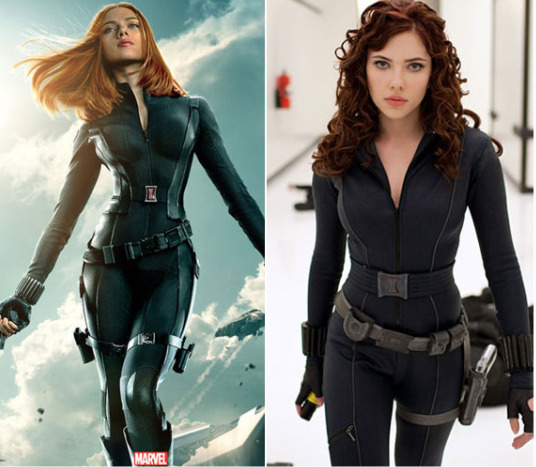
This is true for both hyperfeminine and hypermasculine stories. Both the men and women starring in mainstream productions are expected to exemplify a western ideal of peak beauty standards at all times. However, where the hypersexualization of male’s bodies is associated with power, dominance, and strength, the sexualization of women’s bodies is linked to submission, frailty, and possession. Hence the name, “fighting fucktoy”. Her beauty does not make her powerful, it makes her a “toy”, an object, a possession. The sexualization of men in media gives them power within their narratives. For women, it does the complete opposite. It makes them objects, even when they are strong. Beauty and sex make them the victims of their own stories. Ultimately, the hypermasculine male character is envied and emulated, not coveted.
Ironman: Femme Fatale
The storyline of the first Iron Man movie is one concerned with bodily autonomy in a way typically reserved for women--Tony Stark is presented as a fighting fucktoy with an unattainable heart. Not only that, he must struggle against the literal policing of his body by friends, family, and government agencies alike. This subversive, unexpected feminine story culminates in the pinnacle “rape scene” wherein a trusted older-male drugs and assaults Tony in order to take advantage of his “body”, the arc-reactor.

Let’s examine Tony’s coded “fighting fucktoy” persona in two parts: the “fighting” and the “fucktoy”. Miss Representation identifies what female leadership often looks like in movies. “When it comes to female leaders in entertainment media, we see the bitchy boss who has sacrificed family and love to make it to where she is” (2). Odd as it may seem, this perfectly encapsulates the metaphorical role of the arc reactor powering the Iron Man suits. First and foremost, the reactor represents Tony Stark’s heart. Not only is it literally located within his heart for the purpose of keeping it intact, it represents his rebirth as a caring, philanthropic man--it encapsulates Stark’s “fight”. Before his kidnapping and the subsequent implanting of the reactor, Stark was every inch the “bitchy boss who has sacrificed family and love” as well as morals themselves in order to be a war profiteer. His “fight” consists of standing up against the same system that had allowed him to amass his fortune. This “fight” is inextricably tied to his “bitchy boss” caricature as someone who has had to surrender love.
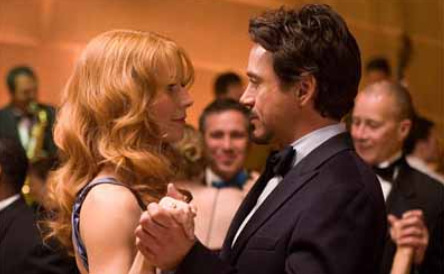
It is clear to the viewer that Stark has had to sacrifice love to get where he is in life. Many allusions are given towards the “will they won't they” nature of his relationship with Pepper Potts and Stark’s work is identified as the reason why they won’t. At the end of the movie, Stark attempts to seduce Potts, asking if she ever “thinks about that night” to which she replies, “Are you talking about the night that we danced and went up on the roof, and then you went downstairs to get me a drink, and you left me there, by myself?” The viewers are aware that the reason Stark ran off was because he had received news that Stark weapons had gotten into the wrong hands. Later, Potts will gift him the original arc reactor with the engraving: PROOF THAT TONY STARK HAS A HEART surrounding it. In an unconventional way, Stark portrays the frigid boss who sacrificed everything to get where she is in his titular fight against a war profiteering machine.
Next, let’s examine his role as the fucktoy. This is a more subtle theme throughout the film, present in body language and subtext. I will focus mainly on scenes which present a femme-coded sexualization--scenes where emphasis on Stark’s body does not lend Stark power, but instead strips him of his autonomy. Take for example the scene pictured below. In this scene, Stark bares his chest to Stane. He is quick to cover up and fruitlessly attempts to redirect Stane’s curiosity. Much like a scene where an attractive woman shows skin, the emphasis is placed on Stark redirecting Stane’s predatory interest. Notice the tension in Stark’s stance, the challenge in his eyes and the contrasting pose of Stane, mid-motion, pushing so close into Stark’s space. Stane is clearly coded as the aggressor once the reactor comes out. The same effect is observed as when a woman bares skin--an apparent loss of autonomy as other characters (and even the cinematography itself) takes a pornographic view of her body. Instead of a powerful male character baring his chest in the heat of a battle, giving the audience a glimpse of corded muscle and strength, this scene leaves the viewer feeling uncomfortable on Stark’s behalf.
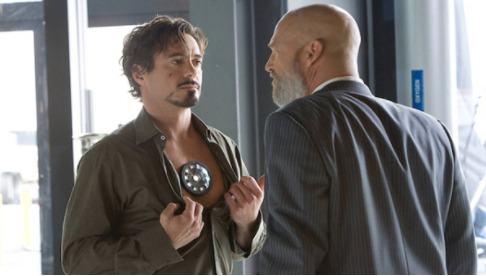
[TW Start] This femme-coded sexualization that leads ultimately to a loss of autonomy again rears its head in the titular “rape scene”. This is the clearest instance of the reactor--a literal part of Stark’s body, symbolically present as his heart--lends itself to his victimization. Just as a hypersexualized female character with no bodily autonomy, Stark’s bodily autonomy is forcefully violated so that a powerful male figure in his life can exploit a part of him. This theme becomes horrifyingly clear when the scene is examined up close.

Notice the position of their bodies. Once again, Stane towers over Stark, pressing into his space on all sides. In the first image, to the right, he has an arm draped over the back of the couch--a parody of a romantic or perhaps affectionate gesture from one intimate partner to another. Stane visibly radiates power in this position, even if the viewer were unaware of Stark’s paralyzed state. Stane’s shoulders are squared, even sitting down. The position of the reactor in his hand is relaxed and undeniably taunting. Looking at Stark himself, the horror and powerlessness of his situation is clear. His eyes are open, but almost appear to be unseeing. He is not looking directly at the reactor nor at Stane. In fact, it seems as though his eyes are looking below the reactor and to the room at large. I can only describe his expression as hollow--the blank eyes fixed out to something the viewers cannot see, his mouth partially open, his skin sickly pale.
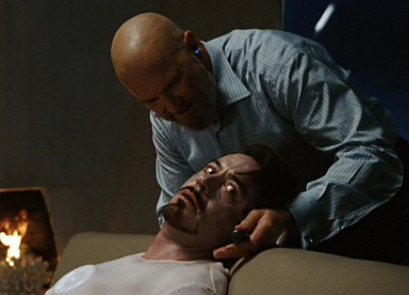
In the second image, pictured above, Stane leers over Stark’s body, cradling his head in, once again, a parody of a lover’s tenderness. He coaxes Stark’s now limp form down onto the couch, having just paralyzed him with a fictional, technological nerve agent. The horror is shockingly clear on Stark’s face and the perverse joy is just as clear on Stane’s. This scene itself is an undeniable parody of rape, or, at the very least, physical assault. [TW End]
Tony Stark presents us with a clear, femme-coded character as his story line draws upon classicly feminine tropes wherein the sexualization of the character’s body is exploitative at heart and leaves them vulnerable to physical predation. In this way, though he is strong, his “body” makes him the victim of his own story. Not only that, his character arc itself travels from the heart-less profiteer to the philanthropic man with a heart of gold, drawing upon another classically femme-caricature of the “bitchy boss”.
Queer Tropes & The Closet
Queer tropes are much harder to draw upon than that of feminine tropes. Queer tropes in film developed in a time of great censorship and as a result are often subtle. There are three main tropes I would like to reference for the purposes of this critique. Within the Iron Man franchise, there exists a distinct sense of camp, a problematized sexual promiscuity, and, ultimately, an identity-reveal/coming out storyline.
One of the most obvious of these tropes is camp. Camp is “defined as the purposeful and ironic adoption of stylistic elements that would otherwise be considered bad taste. Camp aesthetics are generally extreme, exaggerated and showy and always involve an element of mockery” (3). Camp is present in queer culture most commonly in the ball and drag scenes. Camp is the gaudy, the glitzy, the over-the-top, the classic-but-not, the in-your-face… Camp is all of the above and more. This is why it is so easily recognizable to audiences.
The Advocate identifies a series of seventeen queer caricatures in media for consideration, one of them being that of the “promiscuous queer”. Everyone knows the myth of the promiscuous bisexual, even when the reality is that bisexual individuals are no more or no less likely to view monogamy as “sacrificial” than gay or straight individuals (4). The stereotype of the promiscuous bisexual is inaccurate and harmful, and they are by no meals alone in being labeled overly promiscuous by a general audience. The “promiscuous queer” is defined as a character that may struggle with emotional intimacy and, as a result, sleeps around to mask the love they are missing in their life. “Films going back as far as the ’80s British period piece Another Country have featured gay male characters who use sex to cover for their inability to feel true intimacy with another human being” (5). Among their list of guilty perpetrators are Queer as Folk, The L Word, The Good Wife, and How to Get Away With Murder.
The last trope I’d like to present is that of the “coming out” story. Far from being problematic, the “coming out” is often necessary when telling a queer story. Coming out storylines can be problematized when they are presented as “Big Dark Secrets” that weigh heavily on a person until they are spoken. Ultimately, coming out is a choice. Many queer people choose to come out while many do not. There are many people who fall in between--some people may be comfortable being out to select individuals while not to others or to the world at large. In any case, people can be satisfied and fully fulfilled in any of those choices. Coming out stories are undeniably part of queer culture in media. Consider the recent hit, Love Simon alongside Transparent, Empire, Supergirl, and Glee.
Camp, Secrets & Sex
Through the camp of the Iron Man persona, the problematized sexuality of Stark, and the underlying theme of a “coming out” journey, Tony Stark presents audiences with a classically queer experience in film. Take the Iron Man suit itself. The iconic red and gold, the whine of the repulsors, the sleek metal edges and the furious glow of the arc reactor all scream camp. The red and the gold, the opening bars of Back In Black, the facial hair cut into odd spikes, and the sunglasses do, too. Each and every part of the Iron Man persona is camp. “Stylistic elements that otherwise would be bad taste”... talk about gold-plated biceps and a bright red, glowing chest piece! It's camp, baby!

The problematized sexuality of Stark is harder to see as reminiscent of a queer trope. Take, for example, one of the first scenes in the movie. “I do anything and everything that Mr. Stark requires, including, occasionally, taking out the trash”, Potts remarks in reference to a one-night stand she’s ushering out of Stark’s home. Here, Potts implies that Stark sleeps with “trash”. The following scene gives us the feeling that this is not a one-off occurrence. As Potts enters the room, Stark asks, “how’d she take it?” References to his repeated promiscuity are obvious. “Playboy” is an integral part of his persona. Equally obvious is Potts’ disapproval. Taking these inferences of his playboy lifestyle with what viewers know of Stark’s lack of attachments--his “bitchy boss” exterior, if you may--it appears as though his promiscuity is a symptom of the promiscuous queer stereotype.

“Don’t ever ask me to do anything like that ever again,” Potts says after removing the initial arc reactor model from Stark’s chest cavity. “I don’t have anyone but you,” Stark replies. The viewer has a clear picture of Stark as a playboy type who is truly lonely on the inside--who struggles with emotional intimacy. This struggle is evident, given that Potts, Stark’s secretary and co-worker, is the only person in his life he trusts to assist him in what is essentially open heart surgery. His playboy lifestyle mirrors the circumstances of the promiscuous queer trope in media.
Finally, we come to the last scene of the movie-- the climactic reveal. “I am Iron Man”, Stark says. This scene most clearly illustrates a queer story-line. Stark reveals his “identity”, shedding his last secret, and declares to reporters (and effectively the world) that he is Iron Man. To understand how this scene evokes such a strong sense of queer experience in viewers, I’d like to reference another recent in-universe identity reveal in the Marvel Cinematic canon. In Spiderman: Far From Home, the end-credit scene shows Peter Parker reacting in horror to his identity being leaked via doctored footage from the villain Mysterio. This scene can read as nothing but a deep violation. Even the main characters themselves react in abject horror at the news. The Spiderman identity reveal and the Iron Man identity reveal are two sides of the same coming-out process. In one, the character had full agency. In the other, the reveal was non-consensual, a complete violation. It is clear that both of these scenes draw explicitly upon themes that resonate particularly with queer audiences.
To Infinity(War) and Beyond
Growing up, I latched onto Iron Man and Tony Stark as an outlet for my “otherness”. I was well and truly obsessed with the character for reasons that I could not really put into words. He was weird, he was loud, and he was, frankly, unapologetic about any of it. I remember very clearly on my first day of tenth grade listening to Thunderstruck by AC/DC in the car and putting on the brightest shade of red lipstick I could find. Tony Stark gave me confidence. He gave me a voice. Throughout high-school I must have watched the first Iron Man movie upwards of twenty, maybe even thirty times. It was a comfort to me because it showed experiences I resonated with and it showed a strong character recovering from them. Tony Stark rose from the ashes every time and gave me the strength to rise from my own ashes every time he did.
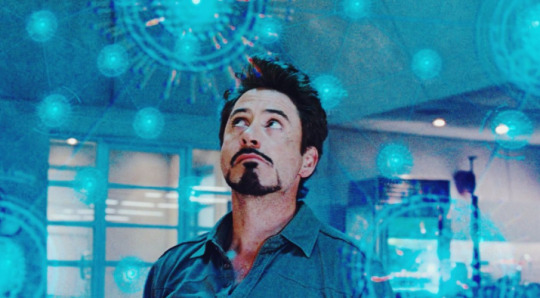
Our heroes can be anything. And Tony Stark was mine.
#thechestnuthead#here you go#yall asked for it#long post#really fucking long post#meta#trixree speaks#ironman#tony stark#marvel meta#analysis#this took a long time rip#if yall want the full paper you can hit me up for a PDF#my posts#trixree gets meta
25 notes
·
View notes
Text
NOT the technical end of the story as i think theres a million more light novels to cover, but since the s2 end feels definitely complete in its own way id figure its worth talking about
86-eighty six is pretty good
i wouldn't go as far as saying 'all time classic/must watch' or anything like that, in part cause i tend to restrain from those assertions and in part cause i dont think it really breaks that barrier of 'landmark' at the end of the day. its conventional but its a good solid conventional that does what it needs to do in telling its story.
- the parable/themes at play do kinda bludgeon over the head, the republic becomes the way it is because a war with no personal cost or investment breeds complacency well the actual people fighting suffer extensively. the republic exploits racial barriers to generate stability at home by othering the population its literally throwing into the meat grinder, a racial divide explicitly between the white haired pale skinned republic ethnonationality and the more ambiguous and multi racial 'coloreds'. visual metaphors about how the republic makes efforts towards appearances as a tolerant empathetic democratic state well really its rotting from the inside into a classist fascistic dictatorship.
- point being, well its definitely a bludgeon i think it generally works in this case cause the narrative isn't trying to be subtle about it. this is the situation, it sucks, yada yada. its that it takes the opportunity to play off of these themes and evolve in a narrative sense instead of just relishing in the abject misery, it even takes the opportunity to play with the audience a little bit by having its s1 central focus be a character otherwise sympathetic to the '86ers' plight but ultimately have her challenged about her own pre conceived biases subconscious as they might be. that is, i appreciate that 86 has something it wants to say as opposed to just dropping a shit sandwich on the floor.
- well i would have loved to see more of... liza [i dont remember her name cause its a bit of a mouthful unfortunately but she is a good character] and her s2 fight against the legion, i think pulling away from her to bottleneck on shin and his perspective was a good idea. s1 hes more so intended as a mystery so well we do get insight into him, id say he didnt quite feel like a character yet. s2 arguably rectifies this with it mostly being about insight into shin and his struggles with guilt, trauma, and detachment/disassociation [and the 86ers in general coming to grips with desires outside of just making it through the next battle].
- its pretty well produced. conventional looking as all fuck, but it puts the budget where it needs to and its spider mech battles are generally competent integrations of cg/drawn animation. plus the spider mech designs are snazzy and sharp to look at, and there feels like a genuine effort to be artful and take advantage of the animated medium here.
- i love the s2 twist that the empire isn't even dead but instead just got 'revolutioned' into the federacy sometime ago and now no one can turn off skynet cause the empire assholes in charge were colossal assholes.
- well the legion on their own dont quite work for me, i love the horror involved with the shepherds and how the legion as a whole are used to reflect on and illustrate aspects of shin.
- musics pretty nice, felt actual emotion anyways.
3 notes
·
View notes
Note
Give me a character : Michael Burnham. Have a nice day!
GIVE ME A CHARACTER;
and I’ll break their ass down:
How I feel about this character
Love of my life. I love her so much in all her glory and complexity and contradictions. I have a tendency to over-identify with her. I love her complex sense of identity, her pride, her dryness, her warmth, her curiosity, her intelligence, her stubbornness... She is such an interesting character and I cannot be happier to have her as the lead.
All the people I ship romantically with this character
Philippa (both versions, yep), Ash, Book, Landry, Nhan, Vance, Tilly in a poly context. Look, she is extremely shippable and I will not apologize for that.
My non-romantic OTP for this character
Tilly, Joann, Keyla, Hugh, Narwani, Sahil
My unpopular opinion about this character
I think she should have been captain from the start.
The show’s handling of her arc regarding her road to captaincy isn’t satisfying enough for me to justify delaying it by three seasons. I would rather have a young captain struggling to find her place and build her authority than two seasons of Michael showing no overt interest in the chair and suffering to prove herself to the people around her and one season of an half-assed captain arc, when she was on the verge of straight up leaving Starfleet.
I understand what they were trying to do, narratively, over these three past seasons; I don’t personally like the way they did it and it sours my enjoyment of the way Michael got to the chair.
One thing I wish would happen / had happened with this character in canon.
More of her years on the Shenzhou, with her getting more at ease with her humanity (her confidence and playfulness in the pilot was so compelling), growing closer to Philippa (and they were so damn close, it makes me all starry-eyed) and earning her stripes, perhaps shaping her respect for Starfleet.
More on her months in prison, or at least a few scenes to address the harm Starfleet did to her, how scapegoated she had been, how shallow the award afterwards in the face of how much it cost her. I wish the show had made it more explicit that Michael didn't cause the war, because nary a character around her questioned it which always felt wrong.
More on her year alone with Book, discovering this new universe without Starfleet, getting comfortable with Book and falling in love with him, rebuilding her sense of self outside of Starfleet, looking for her mom in the future, healing from whatever the hell happened in the last three years.
Let's just say that I find it quite interesting that the periods of time that changed her the most are the ones not depicted/discussed on-screen or only treated through time skips. I am very much from the "You will not see Wolverine run into the woods in his poncey nightshirt" when it comes to backstory, but past a certain point it seems like pussyfooting around engaging with a character's inner life.
Now I only wish that the show will not skip over her struggles and dilemmas as a captain, as well as her victories and joys.
Thank you very much for the ask!
#Anonymous#Star trek discovery#Michael Burnham#Milippa#For ts#Rescribo#Ramblings#Thank you very much!
20 notes
·
View notes
Text
I know we got just a panel, but I can’t shut up about Tooru apparently and log off for the next 3 months, because someone else is going to have to listen to this so might as well drop it here.
Going to expand a little more on the “what if Hagakure is not who she says she is” and “what if she’s not 16 years old” and the implications of that.
Misogyny in BNHA can be seen as “as simple as girls don’t have plot relevance/underdeveloped,” but as I was reading I thought, more specifically younger females have little relevance to the main overarching grand narrative apart from Uraraka, and she’s directly tied to Deku. You could argue that Mina foreshadows Gigantomachia. But what else?
They are treated as only relevant within U.A., and otherwise beautifying the background, while the boys grapple with tensions and internal issues and problems and partake in this grand commentary on hero-state society.
Misogyny is generally the most unrealistic part of BNHA, because Ochako’s story should be about how the economics affect her hero education etc. etc. Idt the cost of U.A.’s education has been ever brought up or the cost of being a hero. What about hero insurance? Why is her family business struggling? Heroes are always busting up buildings, aren’t they? He can’t address that apparently. Lesson to take away? Misogyny = bad world building.
Anyways, sidetracking there. The difference between older females and younger females.
Older female characters (heroes or civilians) have more agency. They exist outside of Deku’s influence (Miruko, Nana Shimura, Rei, Curious, Fuyumi, Midnight, Mt. Lady) and sometimes they are affected by him (Lady Nagant, Inko) I think while I like him as a character, his influence often changes the path of his villains, and that includes women (Lady Nagant.)
Hagakure exists in relative ambiguity. If she’s 16, she’ll be treated as part of 1-A. Because at the end of the day, she’s a kid. She’s not close at all with Deku, and I don’t think he’s ever got a clear reading on her quirk. She’s still struggling and got ways to go. Her classmates are going to be there for her after some grand reveal and apology. She’ll help win the war. Idt she’ll die a horrible death or it will be a Lady Nagant. But she might die a hero. She’d be similar to Toga in this respect.
But if she’s older than 16? I suspect her fate won’t be as kind, but you will also get a completely unapologetic older female villain who has a backstory which might give us a little more about how AFO’s criminal underworld works. So she’s gonna die/lose, but she might be an unapologetic badass putting them through more hell before she does.
Fundamentally in this manga, the older generation sucks. The new gen is gonna do better is the takeaway of BNHA, because it is aimed at kids. If it was Vigilantes, which has older heroes having more nuanced backgrounds, Lady Nagant’s plot would be different. Similar to Hagakure’s. So her age kind of matters, and that’s my lil’ thought for the day.
.
.
.
Edit: So my post was vagued by someone, so let me vaguely also clarify what I mean by plot relevance. It’s not what the female character does. It’s how it’s executed.
In comparison, Bakugou has a parallels with Endeavor, and he has character development in relation to that. That is not how you should be Bakugou. You want to be number one so badly etc. etc.
Comparitively, I don’t see the same sort of growth/relationship for the younger female population of BNHA. Ochako and Thirteen, for example? You could see the difference between rescue work and suppression work and subsequently building up Thirteen and Ochako’s characters.
5 notes
·
View notes
Text
The Cape and The Cowl
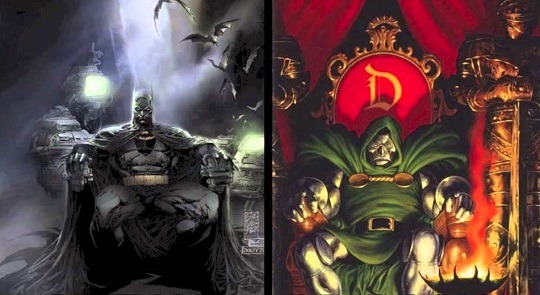
A friend of mine posted a meme questioning who would win a fight between Doctor Doom and Batman. My gut reaction is to say it’s real bad for Bruce but, as i thought about it more and more, i kind of feel like its not so cut-and-dry. There is a lot of nuance that needs to be considered between the two characters rather than just a “smash the action figured together” scenario. Of course, there is the surface stuff like how would they interact generally? What would the catalyst be in order to incite said conflict? Why would Doom even see Bruce as a threat? If you think about it objectively, an all things are even, to Vic, Batman is just a crazy person losing his are on crime in a raggedy ass city. Victor von Doom is a the reagent of an entire country with a GDP that rivals some superpowers in the MCU. Like, the USA has diplomatic relations with a blip in Eastern Europe, because Doom has the military power to wreck he US in open aggression. Latveria will lose in a prolonged conflict, that’s just a question of resources, but that little country would absolutely inflict upon the US in a slow bleed. Imagine the War on Terror but with competent leadership and actual, discipline, military strategy. Why the f*ck would Doom care what the f*ck is going on out in Jersey? More than that. the similarities between the two characters is staggering.
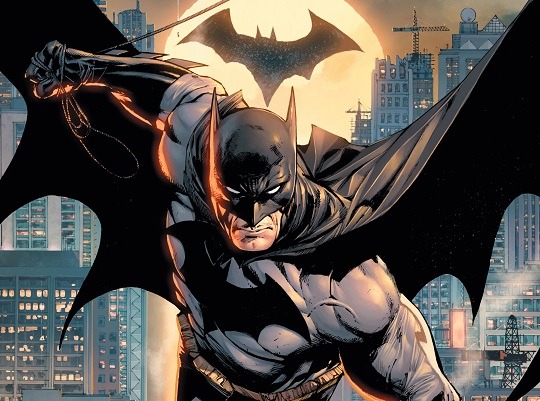
We all know the origin of Batman. We’ve seen that sh*t how many times now? It’s like getting a new Spider-Man joint and having to watch Uncle Ben die all over again. It’s trite at this point but so essential to the character, we need a refresher every time Bats shows up onscreen. That trauma informs everything he is, as it would if you watched your parents gunned down in cold blood as a child, and then laid with their still warm corpses for however long until the police came. What a lot of people don’t know is the origin of Doctor Doom. Being a villain, Doom rarely gets his motivations explored outside of some megalomaniac Dr. No type f*ckery. However, Victor von Doom is a person. He started out life as a happy kid and learned to be Doctor Doom, just like Bruce learned to be Batman. Doom is actually a refugee. True, Doom was born an aristocrat, but Latveria was overthrown when he was still young so he was never able to be raised in that level of opulence. His mom was also murdered before he was ten years old. Just like Bruce, Doom experienced a horrific truth that would color his world perspective for the rest of his life. Doom would eventually find his way to the US as he was brilliant. Like, unheard of intelligent and it would be his exposure to the US lifestyle, after years of conflict and struggle, which would make him realize how easy life could be if someone just did what was necessary. And then Reed happened.
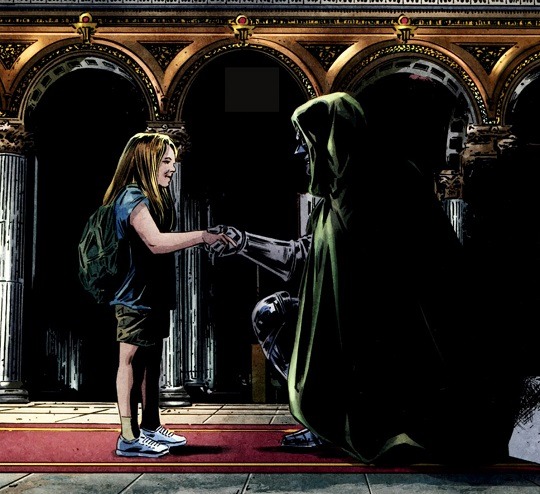
Reed Richards was, is, a fulcrum in Vic’s life. They have a relationship similar to Batman an Superman but the opposite. Whereas Batman values Clark’s perspective because it helps him keep perspective, Vic finds Reed to be absurd. He sees Reed for who e is and doesn’t understand why no one else can. Reed Richards is a reckless, excitable, short-sighted, glory-hog. He is. If you read the character with any semblance of realism, you’d see that. Ho many times has Sue comments on how she and the rest of his family, take a backseat to science? How many times has Reed, himself, sacrificed a relationship or to, in service to the solution of an equation? Doom saw all of that in college. Reed represents the structural issues of the world and it frustrates Vic to no end. In some continuities, the genesis of Vic going full Doom rest on an accident Reed commits because of that shortsightedness. It goes a long way to checking Reeds ego and he does become a better person for it, but it was at the cost of scarring Vic for life, both physically and mentally. Yet another example of the system, ruining Doom’s life.
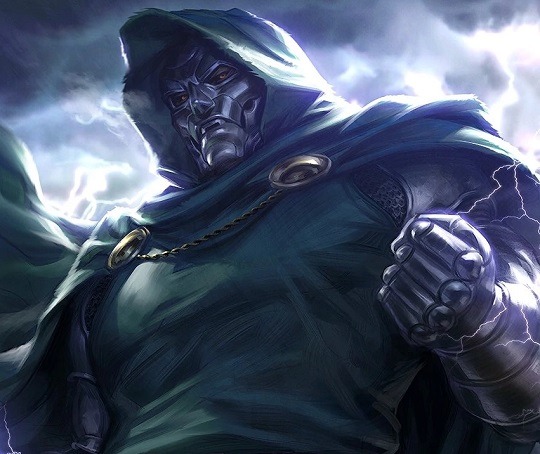
Bruce, after his trauma, has kept a strong support system. First and foremost, since day one, he had Alfred. Doom had no one. Bruce then built a family, adopting all of the children and surrounding himself with love. Doom’s one true love died and was dragged down to hell. We know this because he punches out Mephisto whenever he can. Also, his mom is down there, too. Bruce eventually met Diana and Kal, becoming fast friends and life long confidants. Outside of Catwoman, I think Diana makes for the perfect romantic partner of Bruce and that is shown in several continuities. Reed just reinforced Doom’s disgust with the machinations of the world, eventually further degrading Doom’s tenuous hold of his ability to trust in others, by psychically maiming him. The negative impact Reed had on Doom’s life is f*cking profound, man. I’m not saying Doom should have taken it as far as he did, but it’s hard to argue against trying to kill a dude who had ruined years of your work, destroyed you reputation, and physically maimed you forever. That doesn’t seem wholly outrageous to me. I think it’s called justifiable homicide? The only reason Doom stopped trying to murder Reed is because Valeria was born. Valeria became the first person Doom felt real affection for, since the death of his wife. I think Morgan le Fay could be another, but that might have just been a time-space booty call. Valeria Richards and her relationship with he Uncle Doom, is what gave Vic the strength to be better. Bruce had that love his entire life, even immediately after his darkest day. Doom went decades without it.
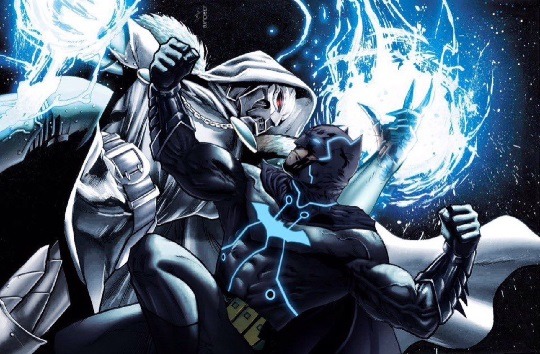
Up until Valeria was born, all Doom had was his time spent as a destitute street rat, struggling to survive, to inform him about life and the world at large. That brazen cruelty for sure emotionally crippled him in a lot of ways, I'm not even going to start to defend his arrogance or superiority complex, but trauma does that. That's why i think Bats would eventually come around. They've both seen the absolute worst of the world and, in a lot of ways, go about righting those wrongs in the same way. If you pay attention, and the writer is worth their salt, you'd see that Latveria is an autocratic socialist paradise. Latverians are among the most literate, healthy, and happy people in the 616. Jobs are plentiful and crime is almost non-existent. Mans even cured cancer, which he made available to the world, if those people choose to make the trip to Latveria for treatment. The world of 616, at large, likes to paint Vic as this evil despot but, if you interview a laymen of Latveria, they’ll sing his praises. Most people forget that, before Doom returned for his birthright, Latveria was a whole ass occupied state. Think the relationship between Israel and Palestine. Latveria was basically falling into doorknobs for Symkaria and pretending that they weren’t in an abusive relationship. Doom showed up and changed all that. It was a bloody f*cking conflict, for sure, and i am certain Vic committed war crimes, but the end result was a free Latveria with a strong international presence. Doom is a hero to those people but a villain to other nations because of how he rose to power and, more importantly, how independent he made hi country from the world system. Doom did what was necessary to free his people, a march too far for Bruce and that’s why Gotham is the way that it is.
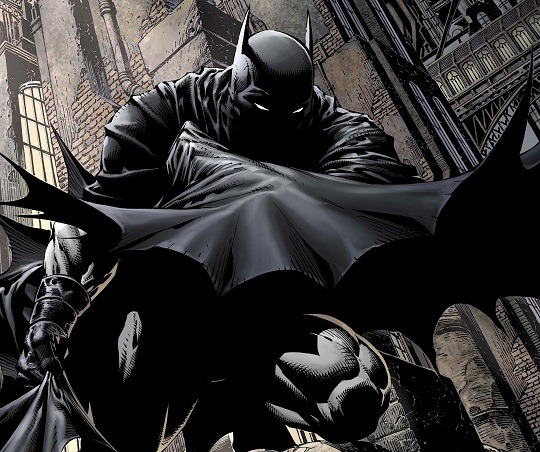
People who don’t know the character like to paint Vic as ego-maniacal villain, and that was valid when comics were just "hero smash bad guy", but we've grown beyond that. Every pop culture interpretation of Doom, outside of the comics, has him as this stoic, arrogant, asshole, dictator bu that’s just not an accurate portrayal of how Doom is in a modern capacity. Vic is definitely an autocrat but he’s no dictator. He can be cruel at times to specific individuals but he is generally benevolent to his people. He doesn’t portray himself as a strongman but he does let it be known he’ll nuke anyone or anything if it means furthering his overall goals which, currently, is the safety and security of Latveria. His country isn’t a police state and his people are free to do as they please but their is a line, just like everywhere else in the world. Doom just has a shorter one and enforces that with extreme prejudice. I’m not going to sit here and say everything is great in Latveria, it’s definitely not, but it ain’t so hot in 616 America either. How many Civil Wars have they had? What about that whole tidbit with Hydra Cap? There is nuance and gray nowadays, areas that both Bats and Doom comfortably call home. Batman is, objectively, not a pure hero. He is, at best, a chivalric anti-hero and similarly, Doom is more of an anti-villain than the mustache twirling, boogeyman, mastermind pop media portrays him to be. Batman and Doom are basically the same person, with the same motivations, only Doom is willing to go much, much, further than Bruce; A difference in method you an attribute to their respective upbringings.
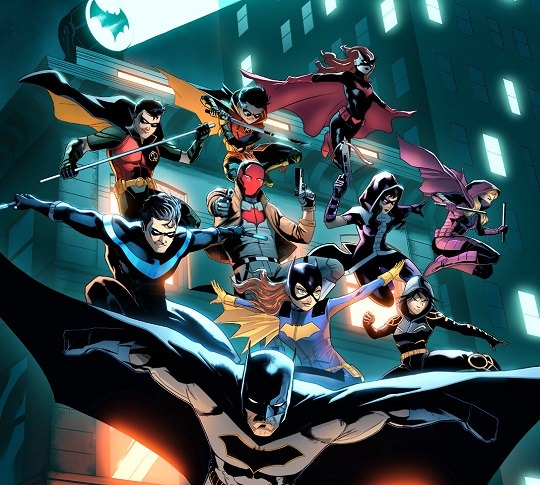
If Doom had the same support system as Bruce, he’d create miracles. We’ve seen glimpses of that throughout the years. Dooms last run culminated with him essentially obliterating an entire universe where he had the support necessary to build a proper utopia. Our Doom couldn’t fathom the choices made by this variant Doom because of how broken he is. If Bruce was alone in his formative years like Victor, he’d commit atrocities. We’ve seen glimpses of that over they years, too. There are various narratives that explore just such a tragic turn of events, explored in the Death Metal series of books. Dawnbreaker immediately comes to mind. Bruce and victor are the same side of the same coins. It's literally a crap shoot as to which side of the alignment chart either leans. And as if to inform my point further, we just recently had Joker War. That book went a long way to exposing the absolute necessity of raw force, in order to properly “save”Gotham. Joker was able to completely dismantle that entire city by attacking the machinery put in lace to make it run. He effectively proved that The Batman was part of the problem and would never be the solution because Bruce doesn’t go far enough. He puts out fires but never address the sparks which start those blazes. He doesn’t go far enough. He never will. His code won’t allow him to. But Doom can. Doom did. Honestly, if you really want to keep it real, what is Bruce's endgame? What does a healthy Gotham City look like? It looks a lot like f*cking Latveria.
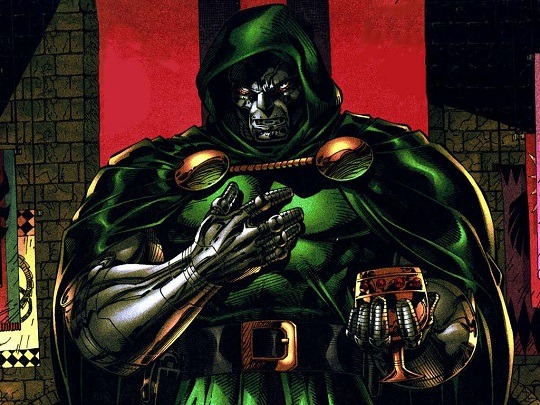
So to answer this question outright, i don’t think they even fight. The way this hypothetical was set up had three rounds: the first being a standard donnybrook, the second being prep time, and the last being god mode. To be perfectly honest with you, it wouldn't make it past the first round. If i had to say, with pedestrian or normie level understanding of he characters, Doom sweeps all categories. For Round one, Doom’s armor trumps all of Batman’s gadgets. For Round Two, Doom has more resources at his fingertips for prep. For Round The God Emperor Doom exists. He created several realities and killed a few Beyonders. Batman sat in a chair which gave him access to all the wisdom in the multiverse, and realized there were three Jokers. Doom all the way. My informed opinion as someone who adores both these character more than most would have me think there wouldn’t even be a conflict to begin with. I think they’d investigate the inciting catalyst, meet in person with intent to attack if necessary, size each other up until one of them made the proposal to just talk, they'd converse, and the fight would end with both of them walking away from each other with begrudging respect. Doom would admire Bruce's will and Bruce would understand the necessity of Doom's position in the world because, if you can make it make sense, Bruce will usually agree. Batman, for all of his shortcomings, is not naive to the world. He’s seen the same darkness as Doom. Doom, for all of his pompous arrogance, understands the struggle to maintain faith in those around you, even if that noble aspiration is misplaced. Bruce is one bad day away from Doom and Doom is a decades worth of days from being Bruce. They mirror each other and i think they’d see that, taking each other as cautionary tales before becoming collaborators. I don’t see them ever really becoming friends but i don't think they’d ever be true enemies.
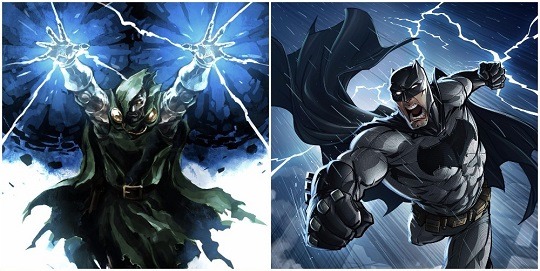
5 notes
·
View notes